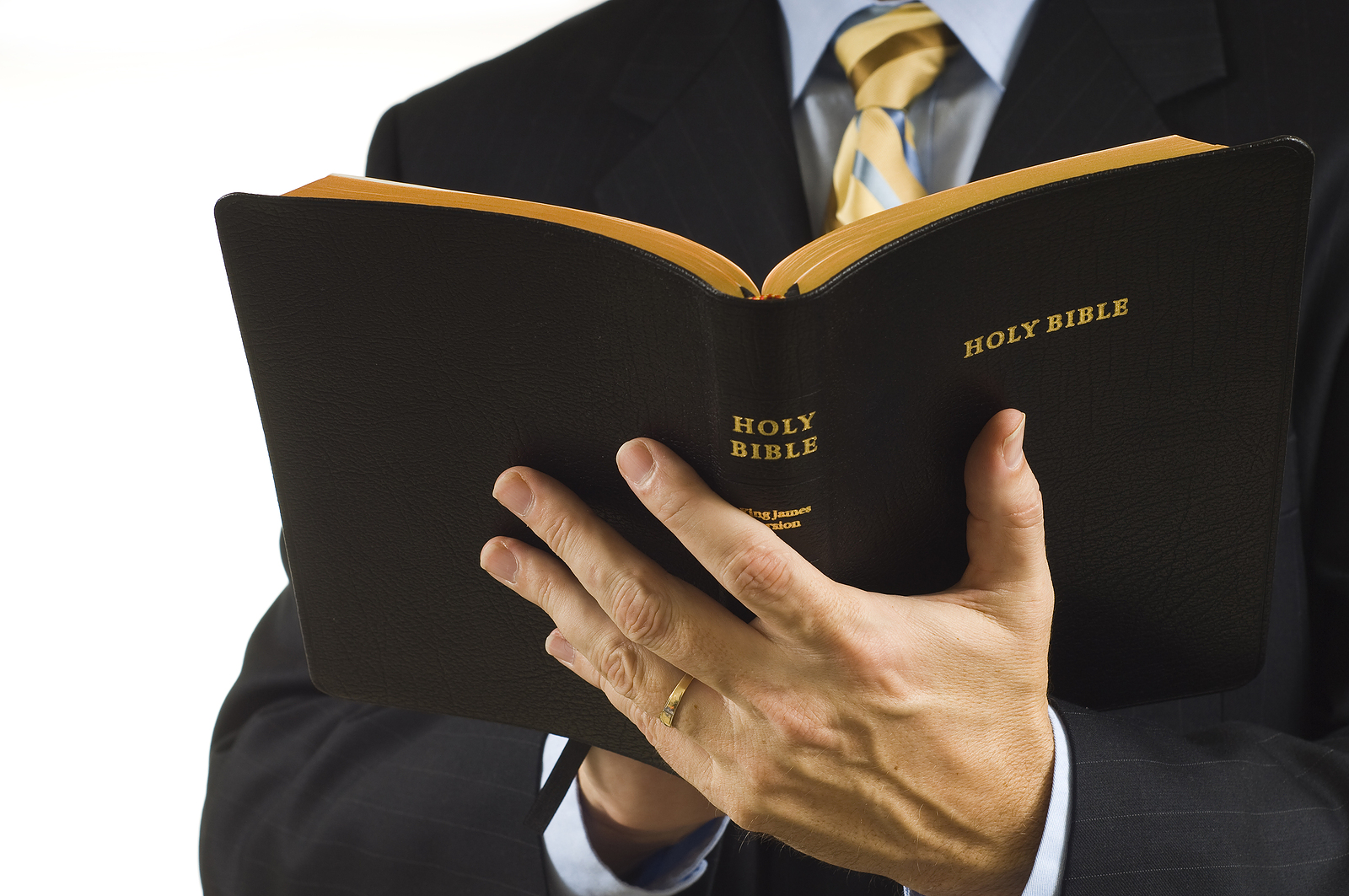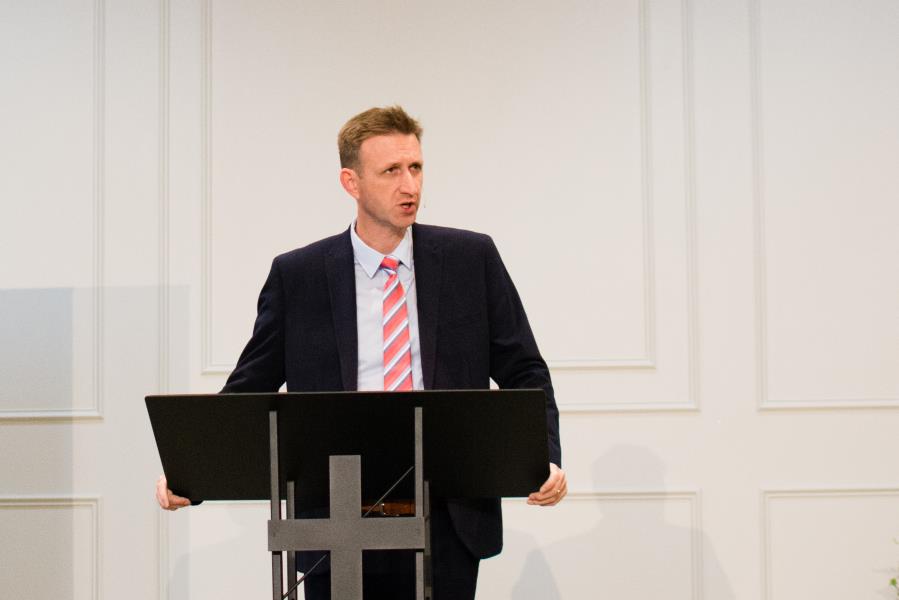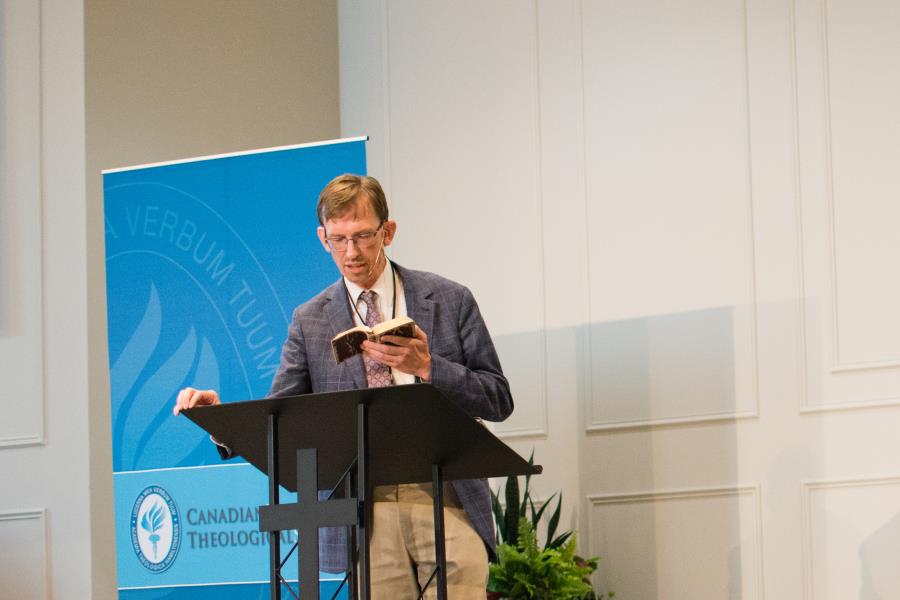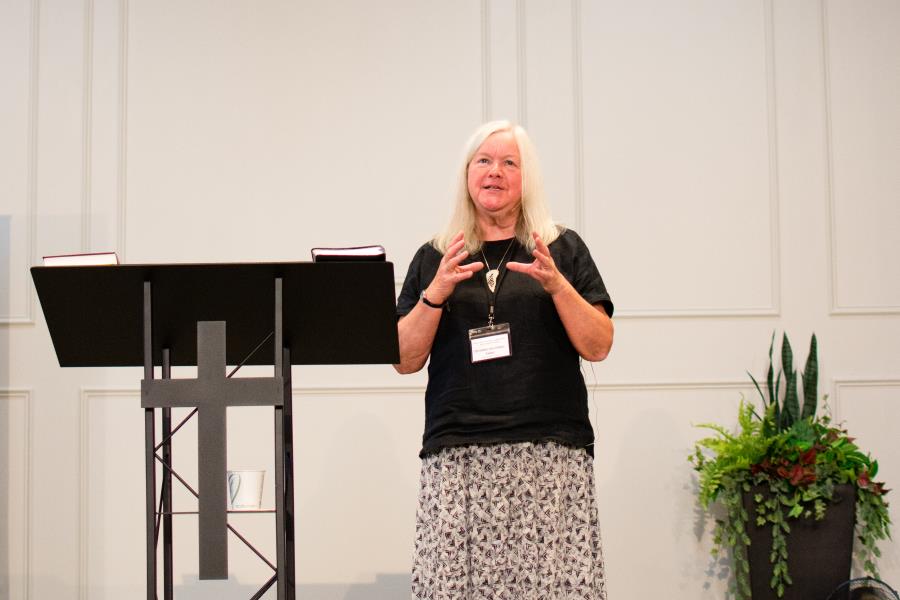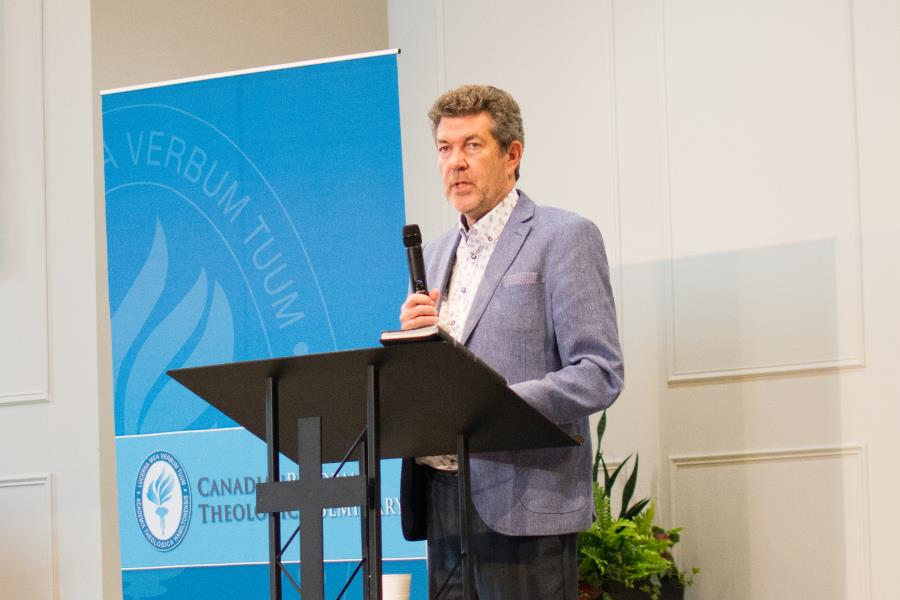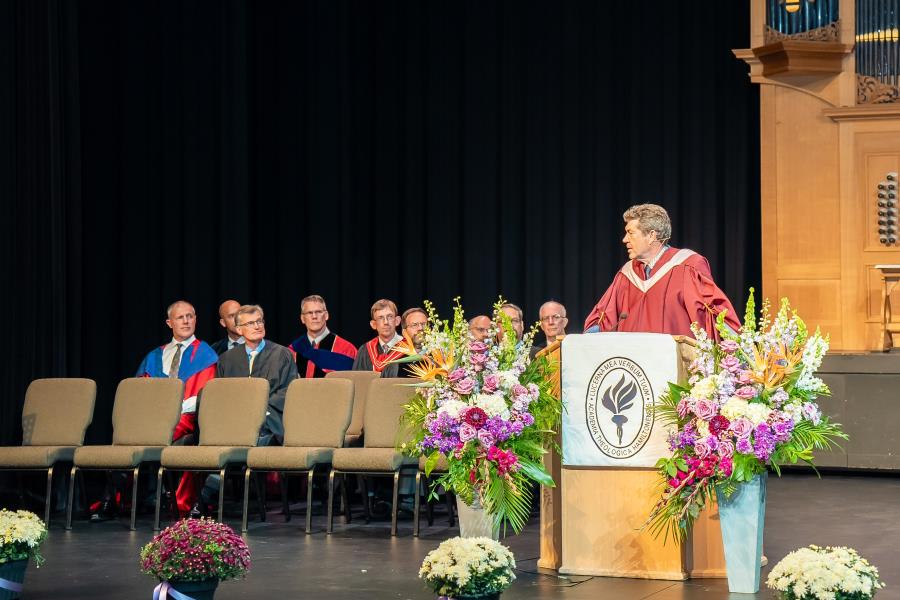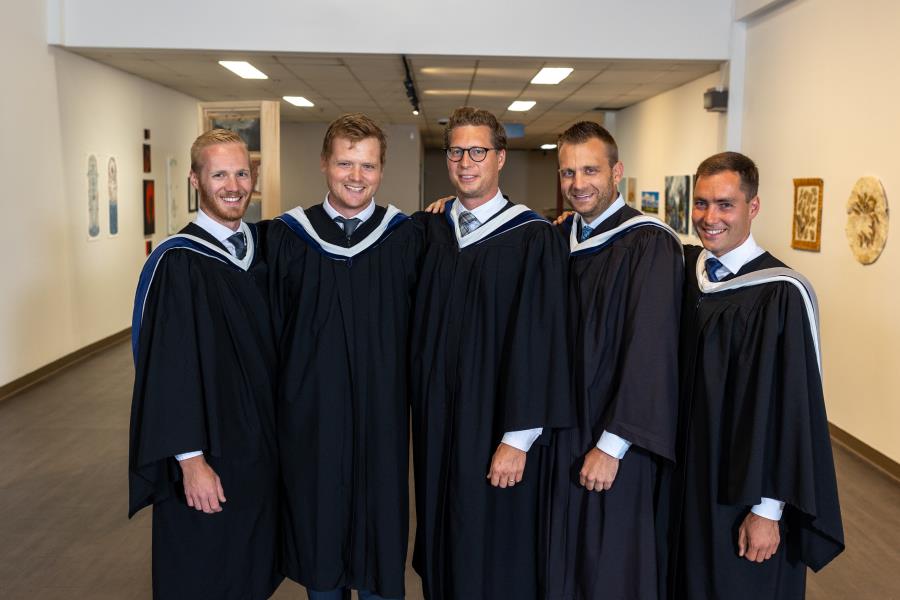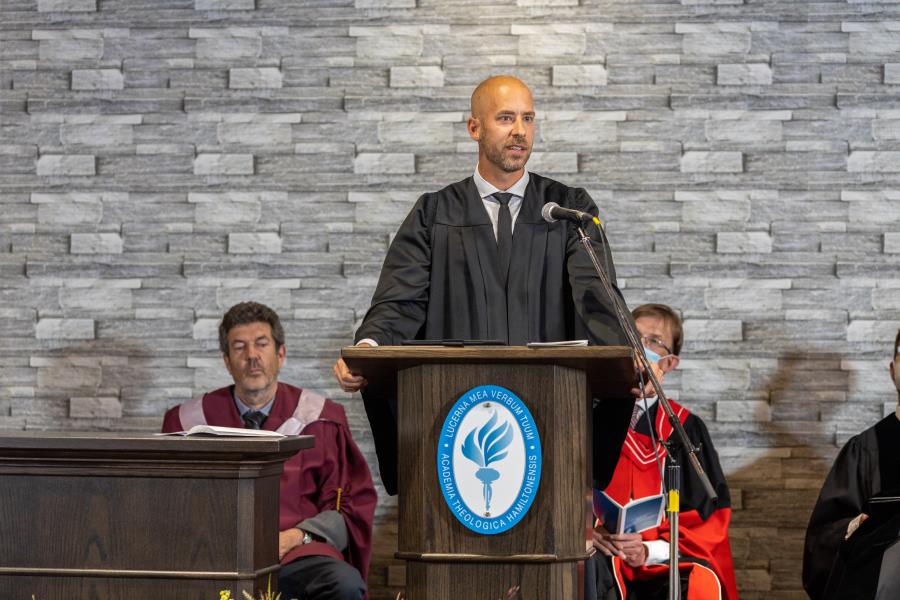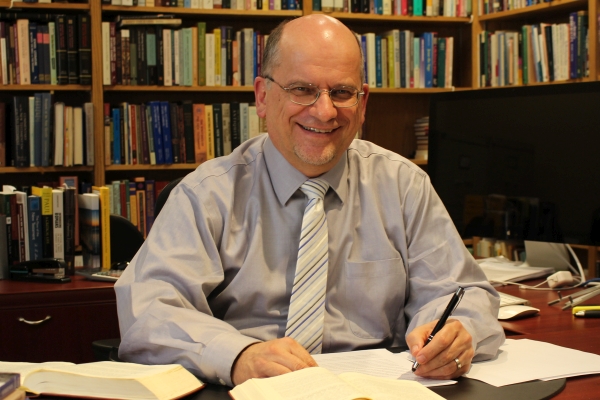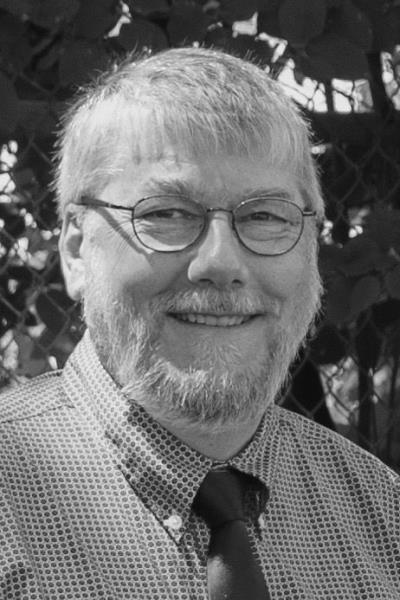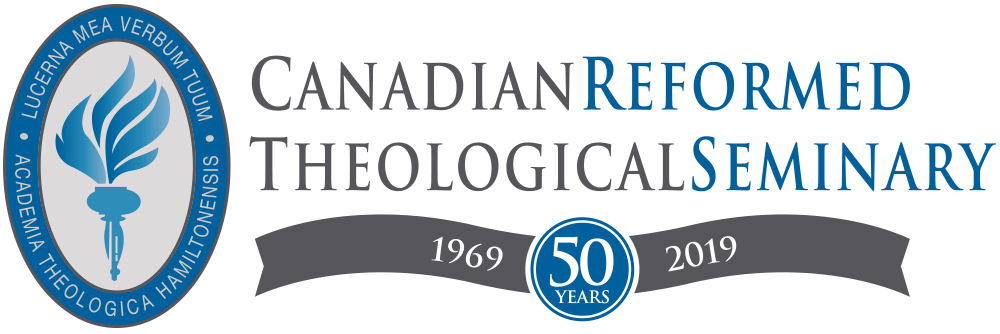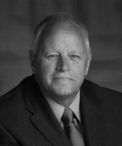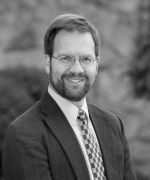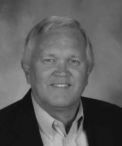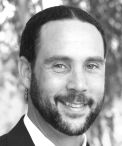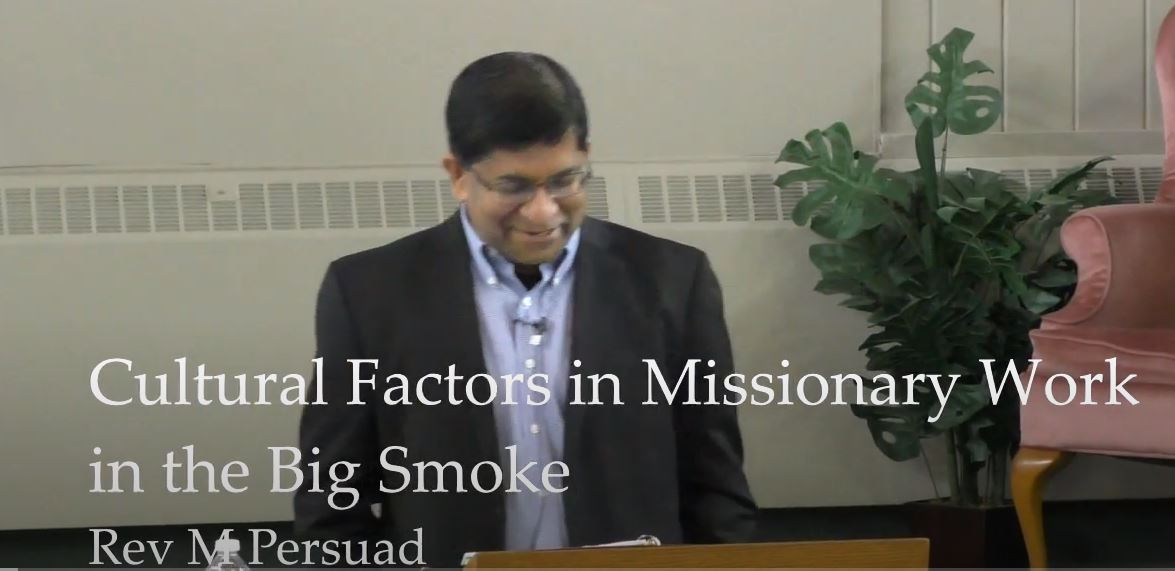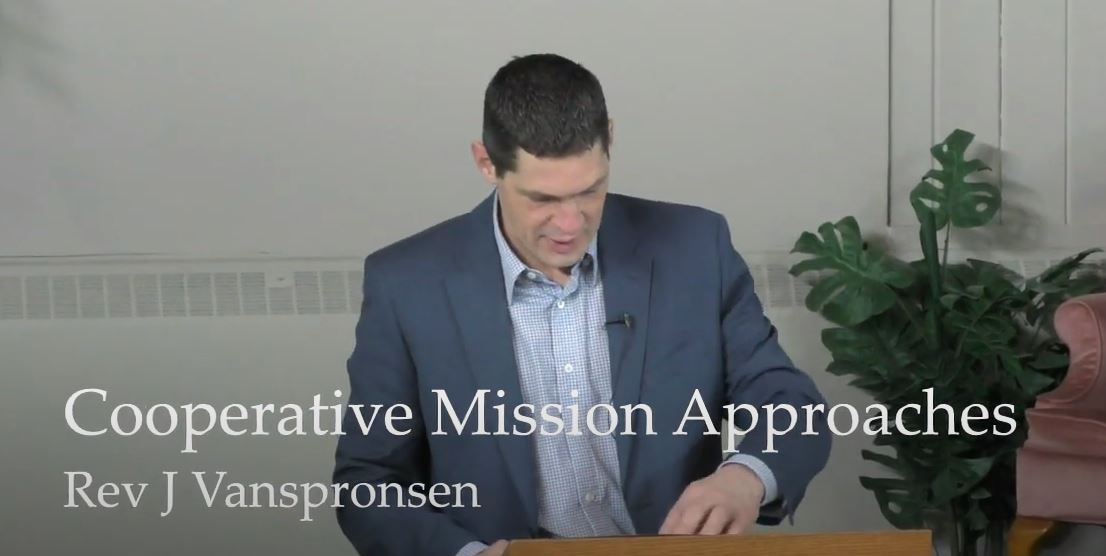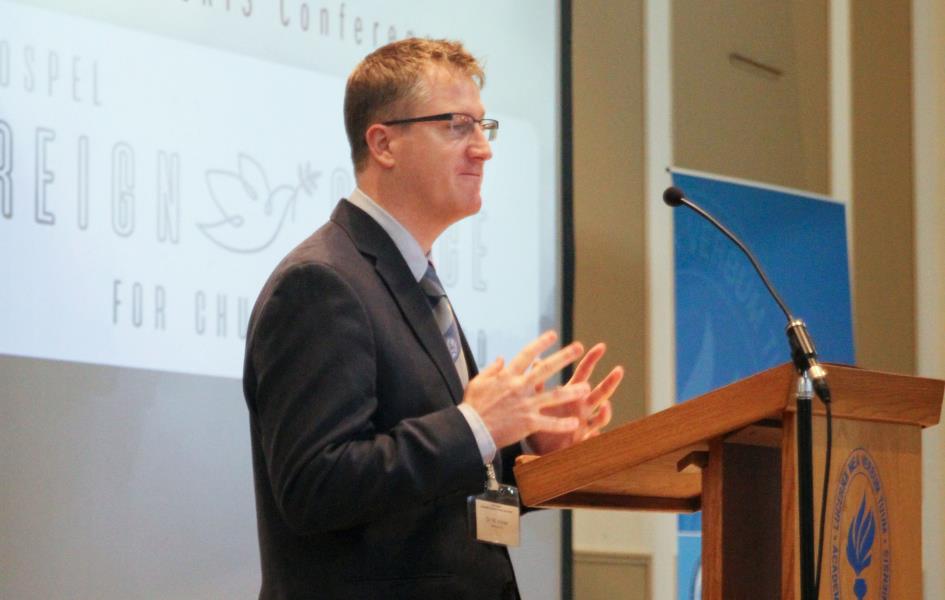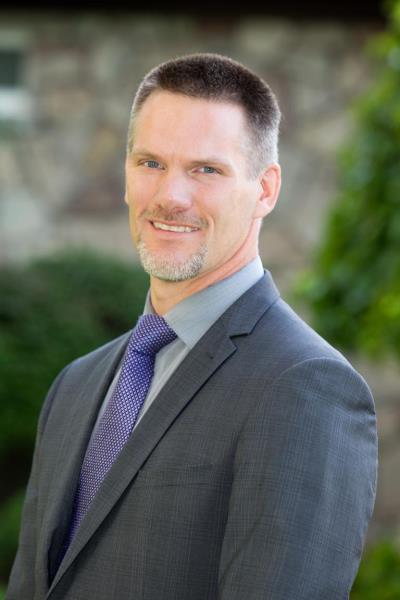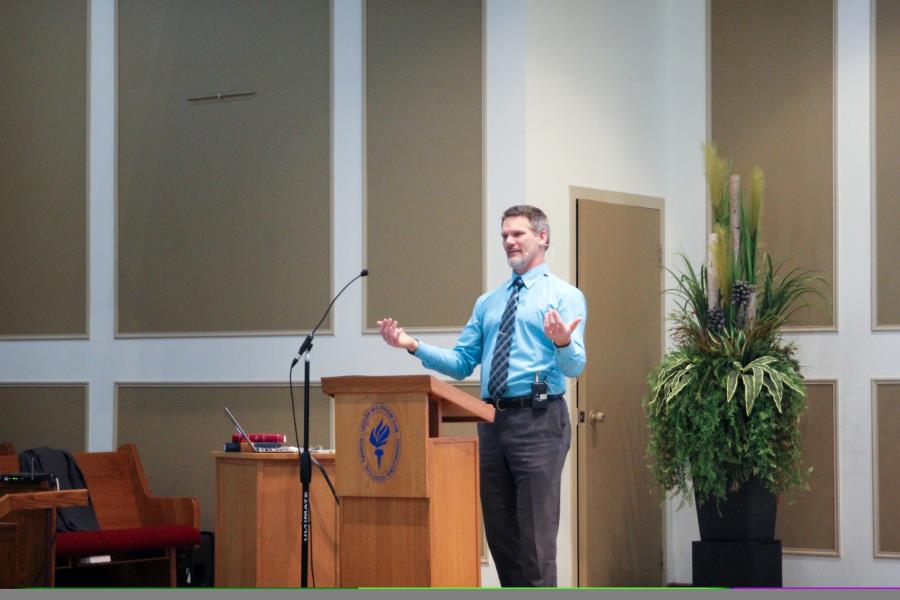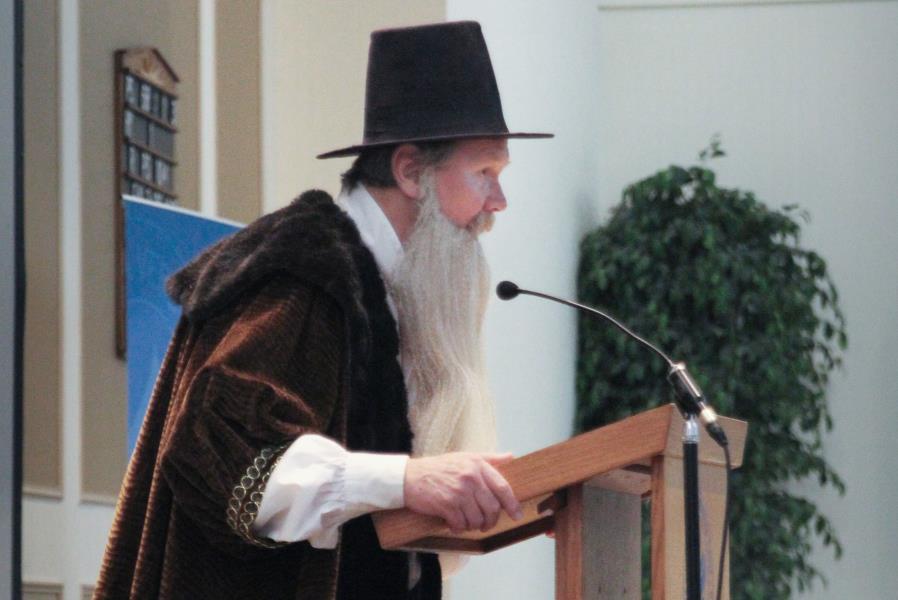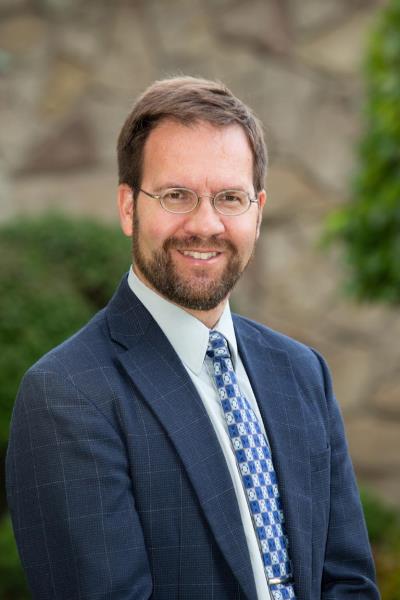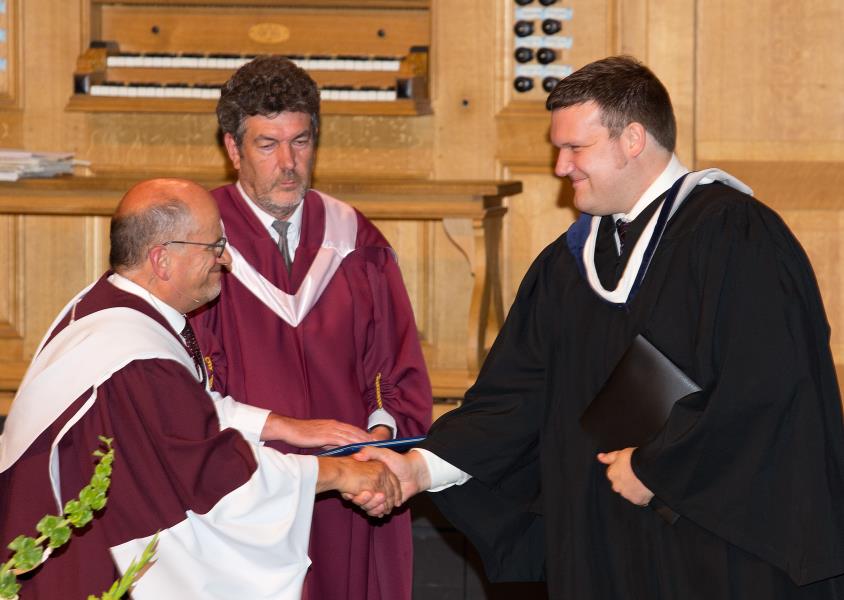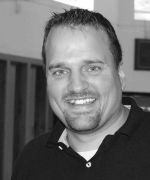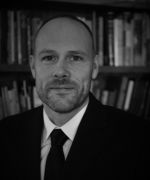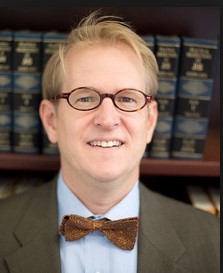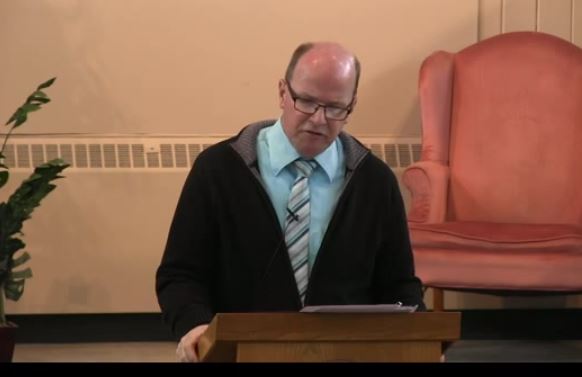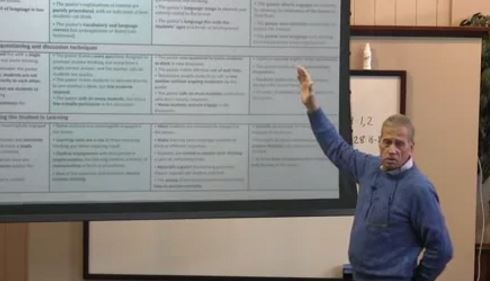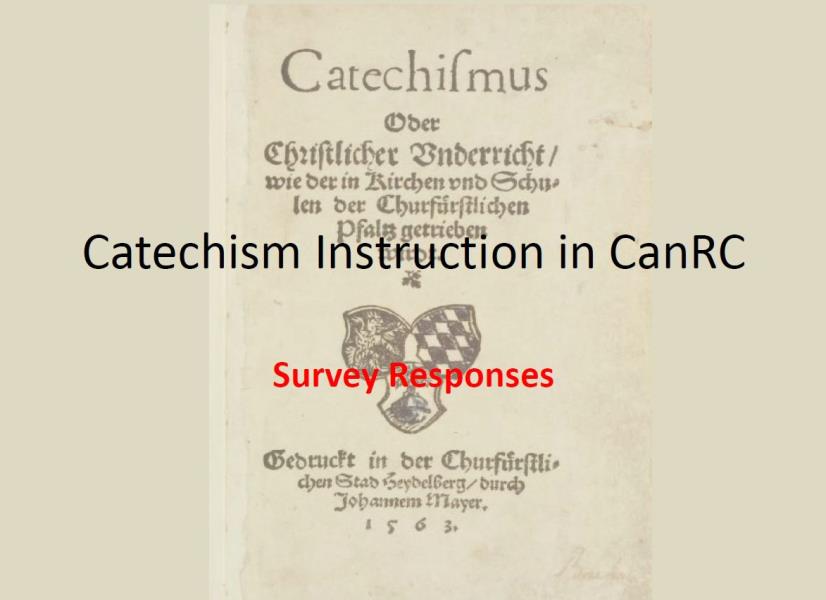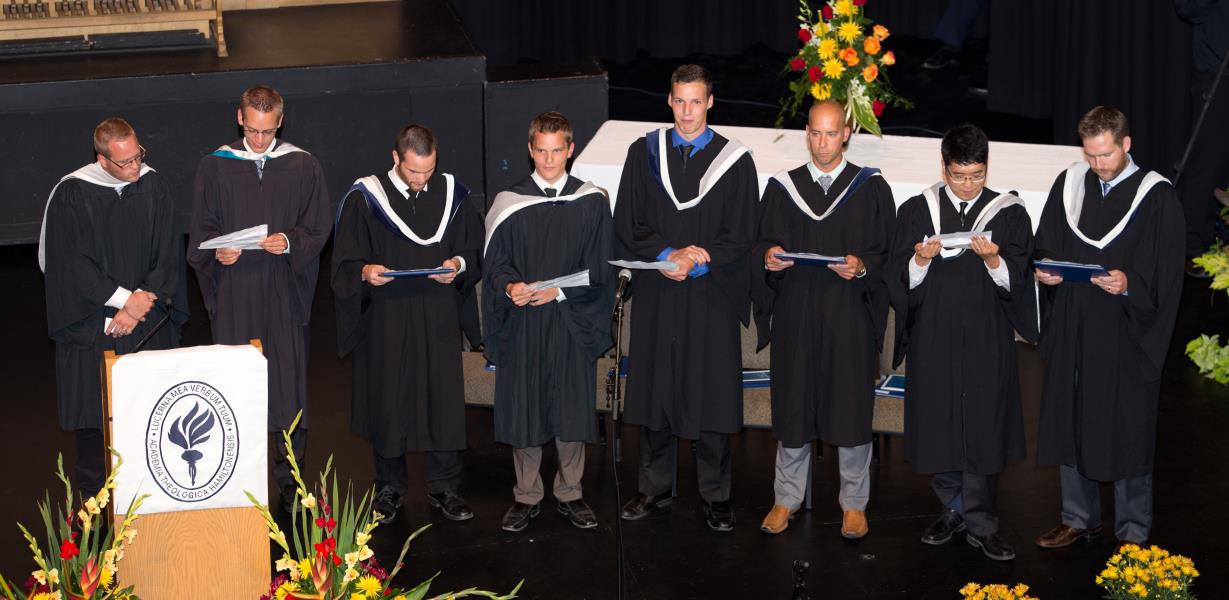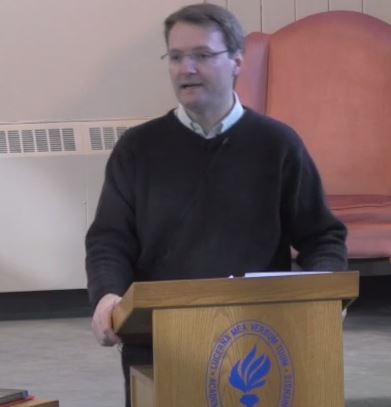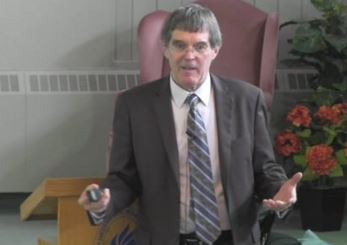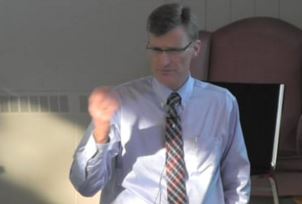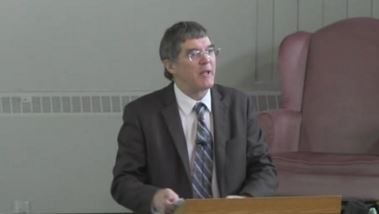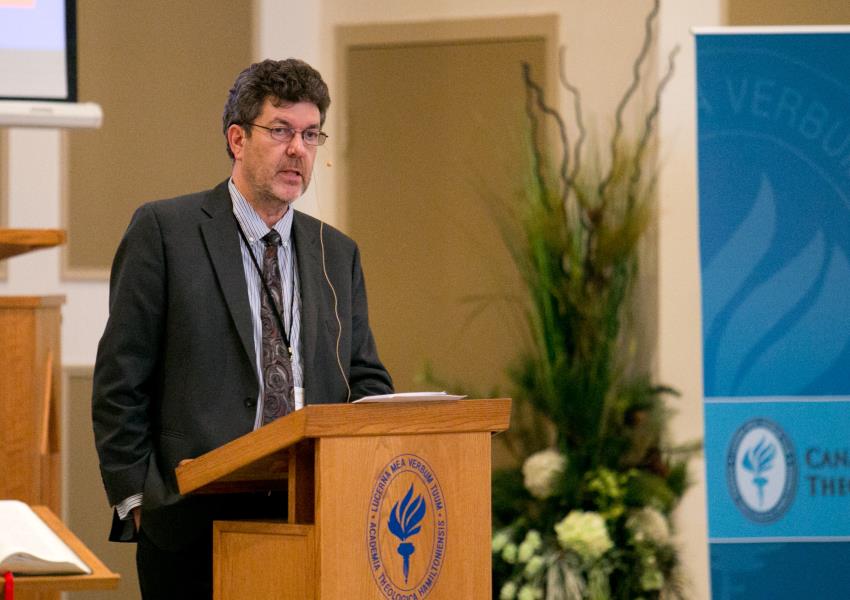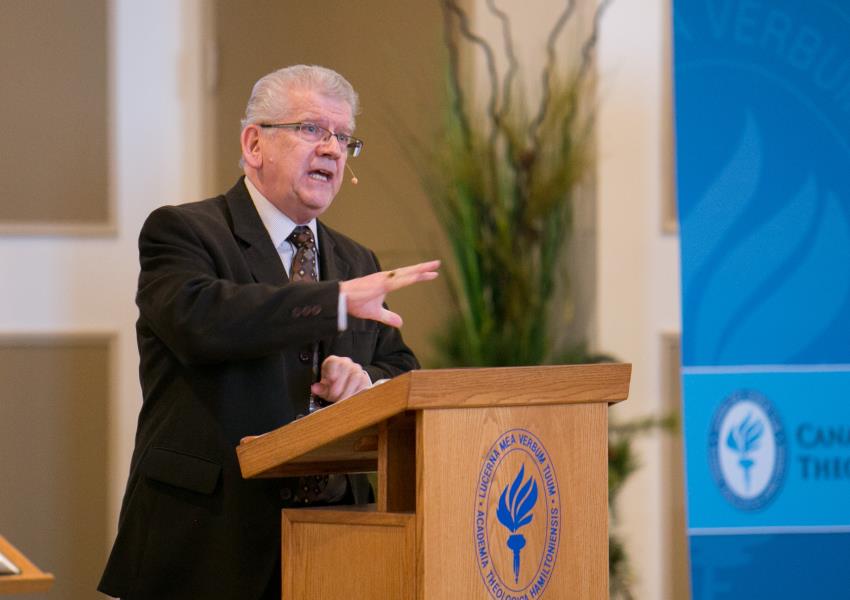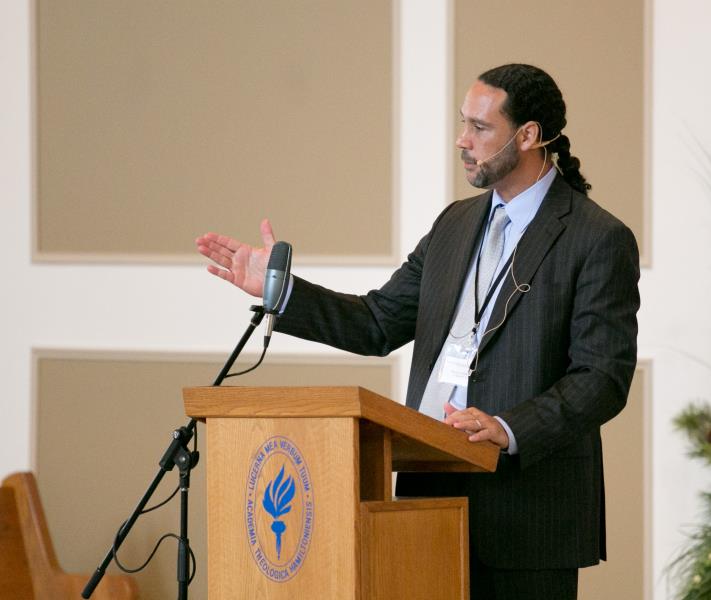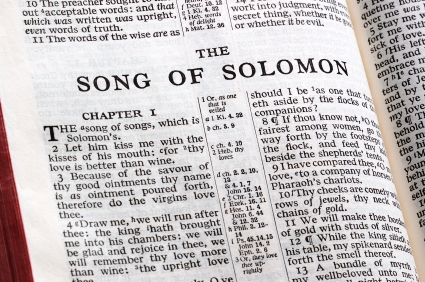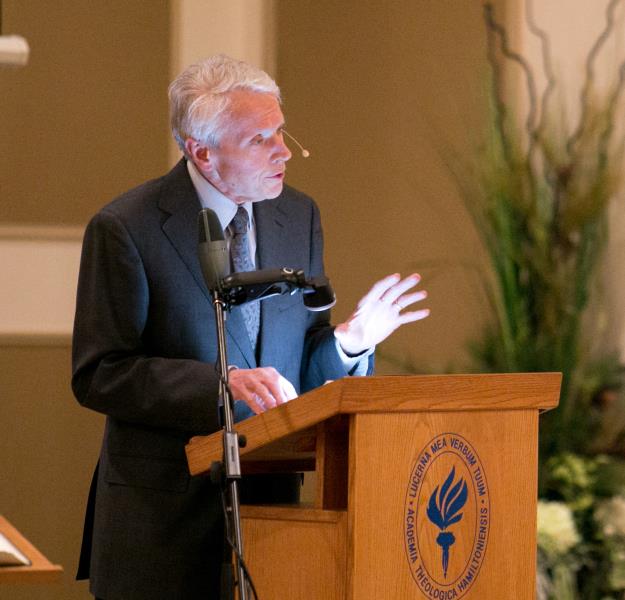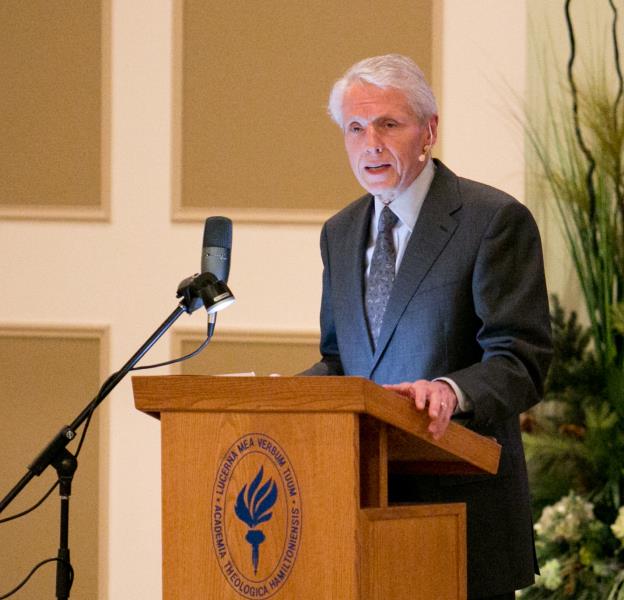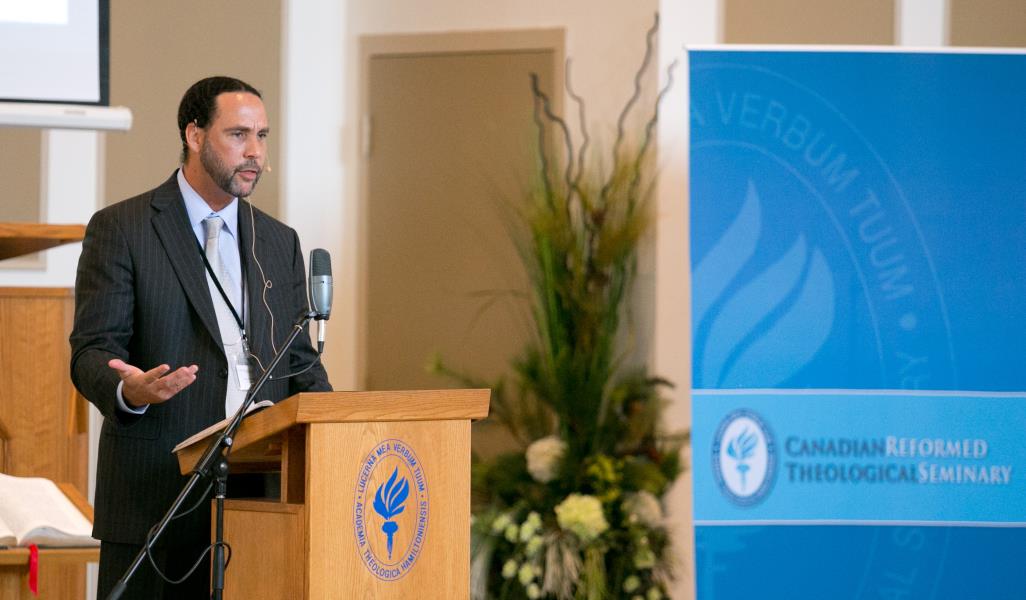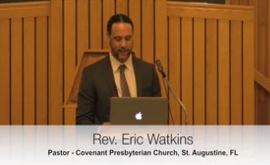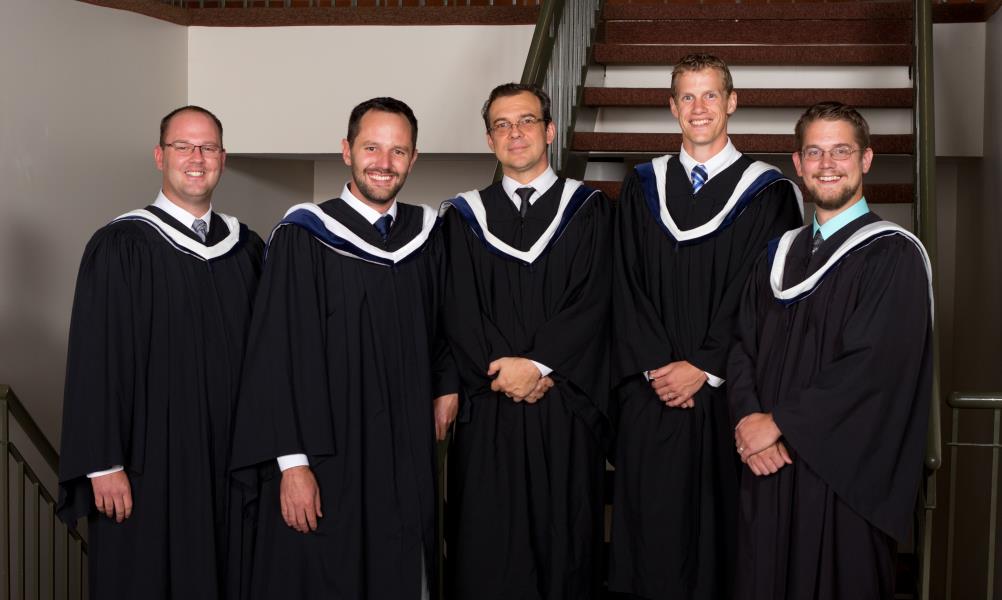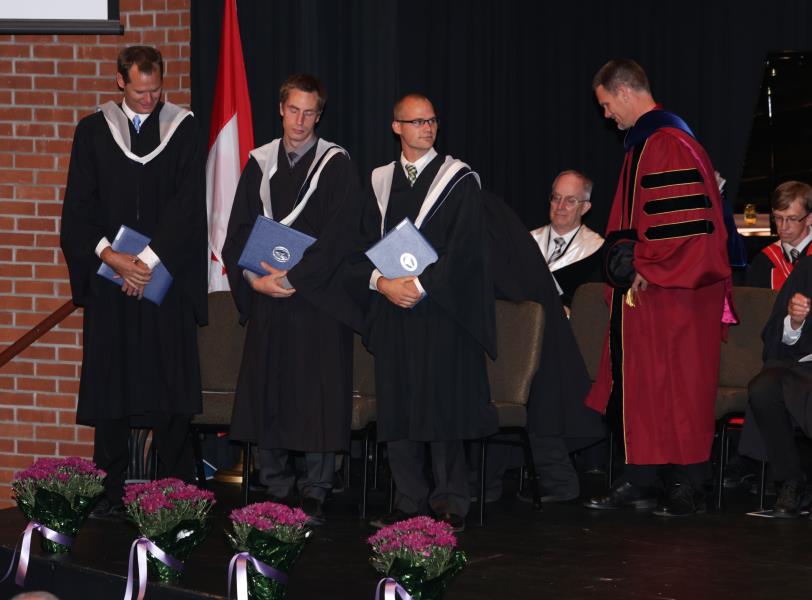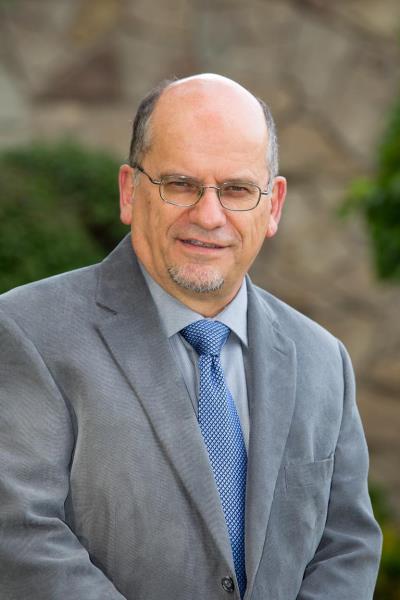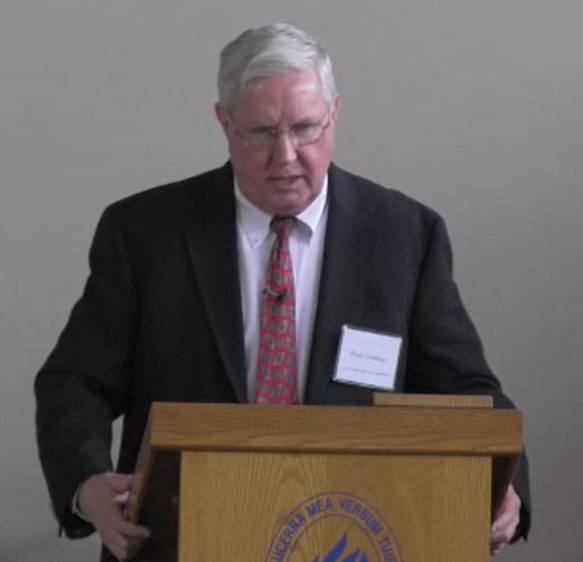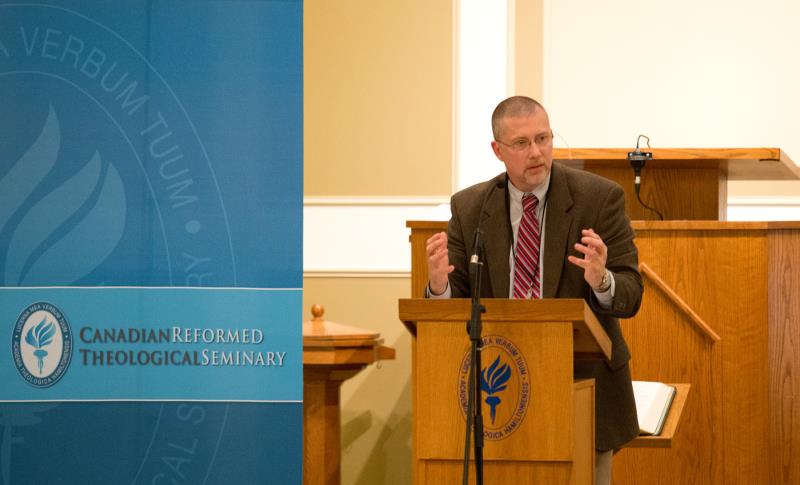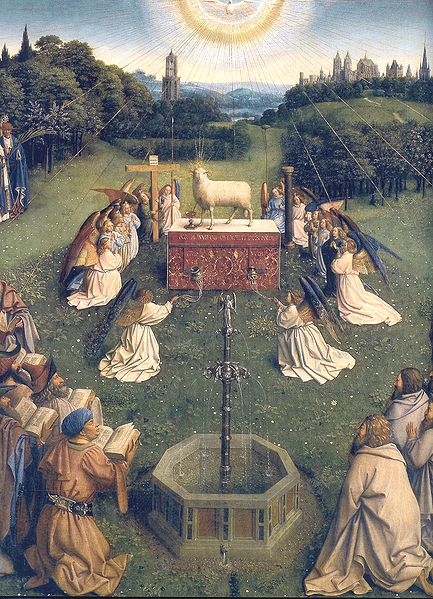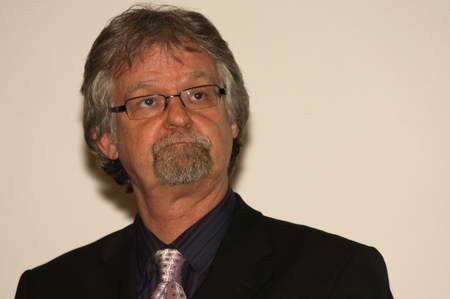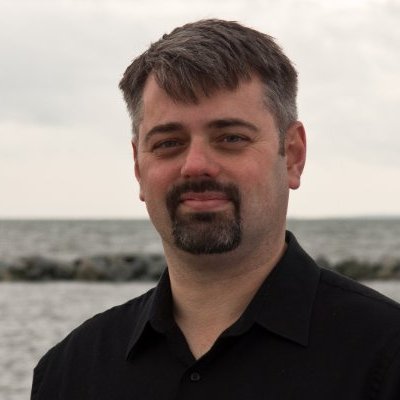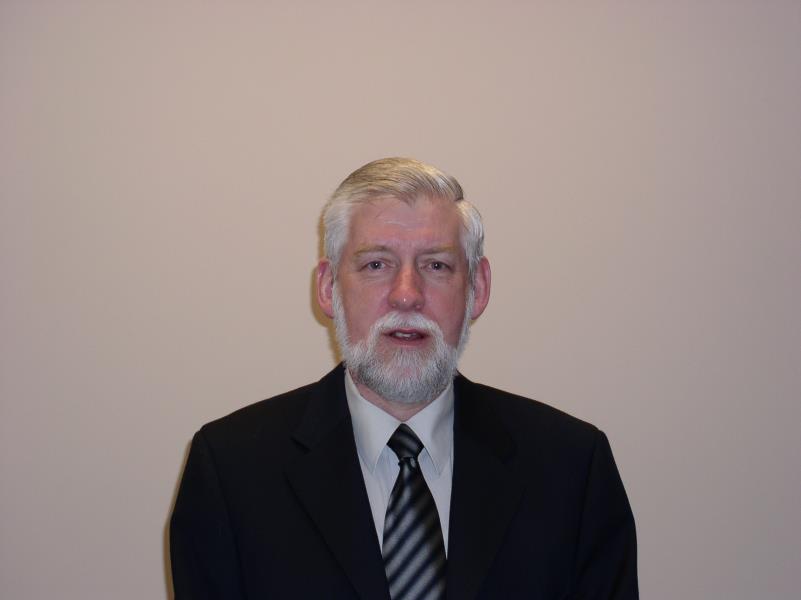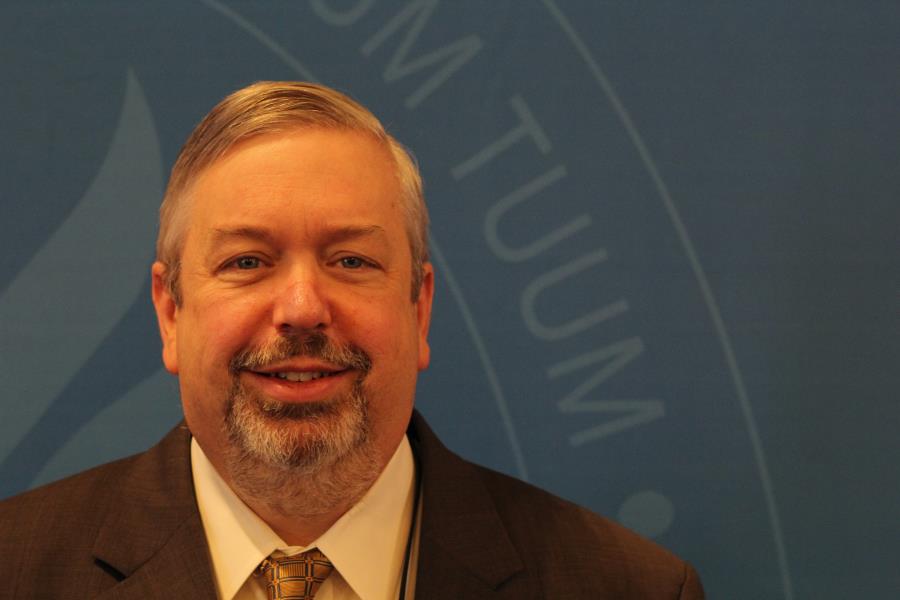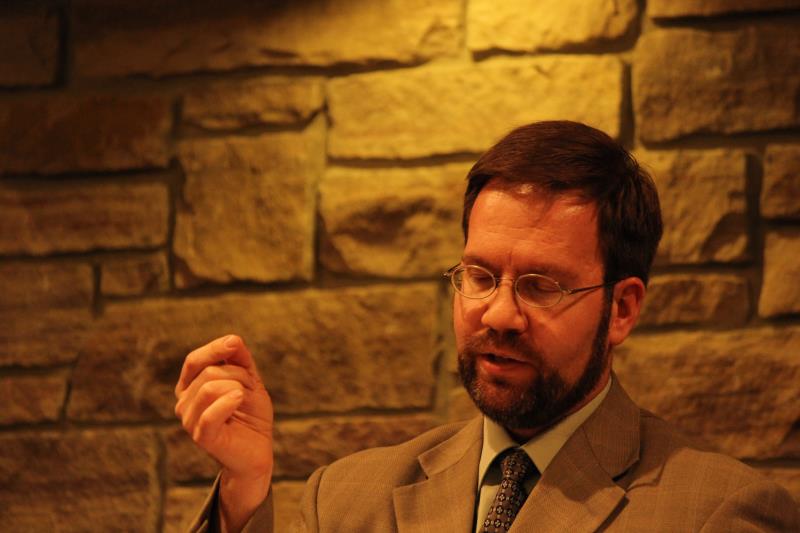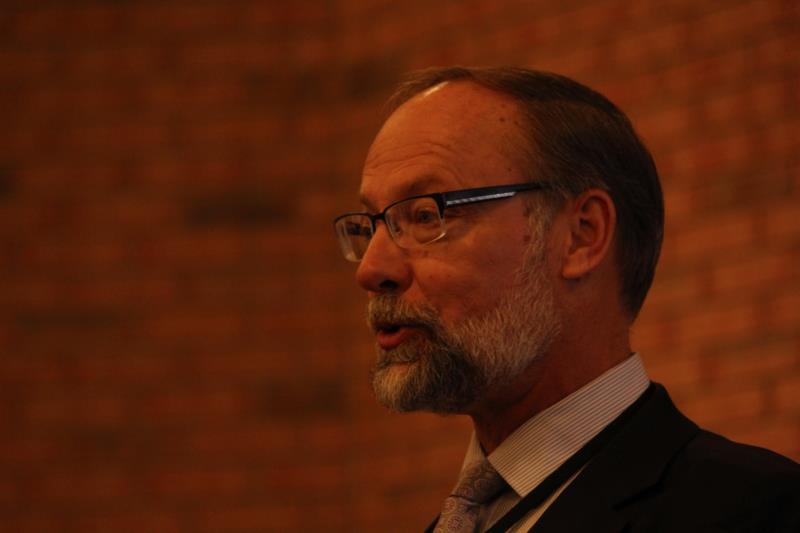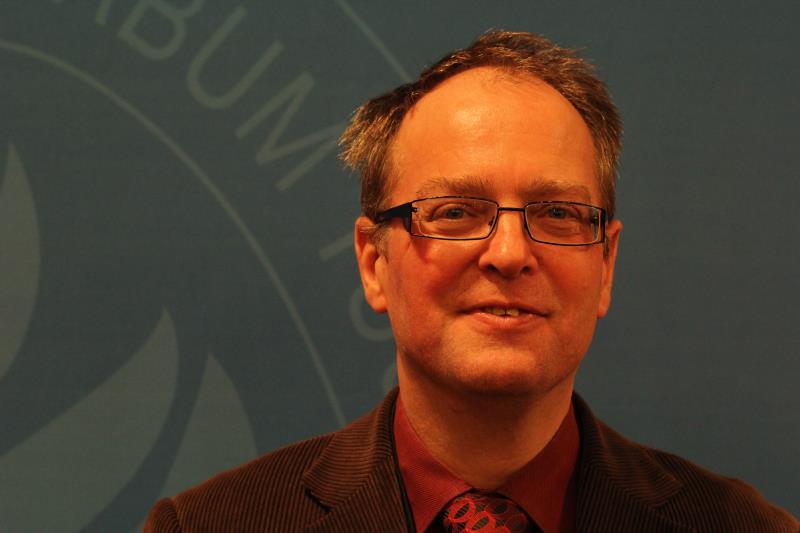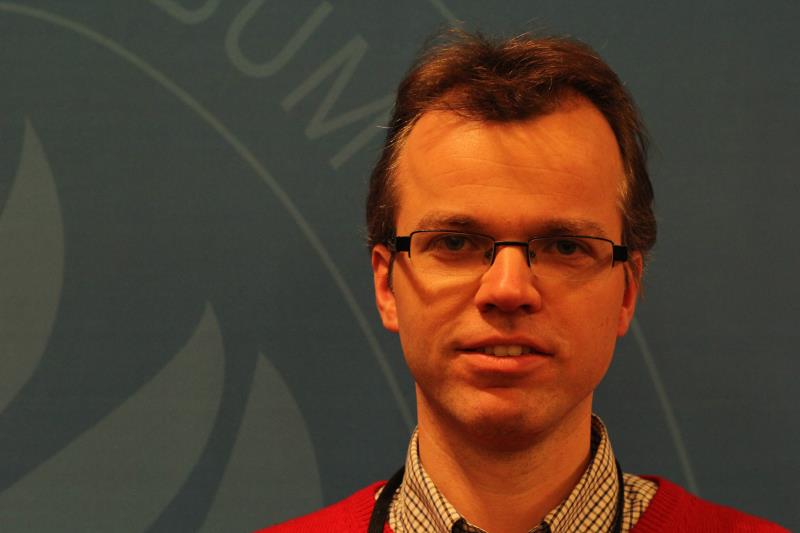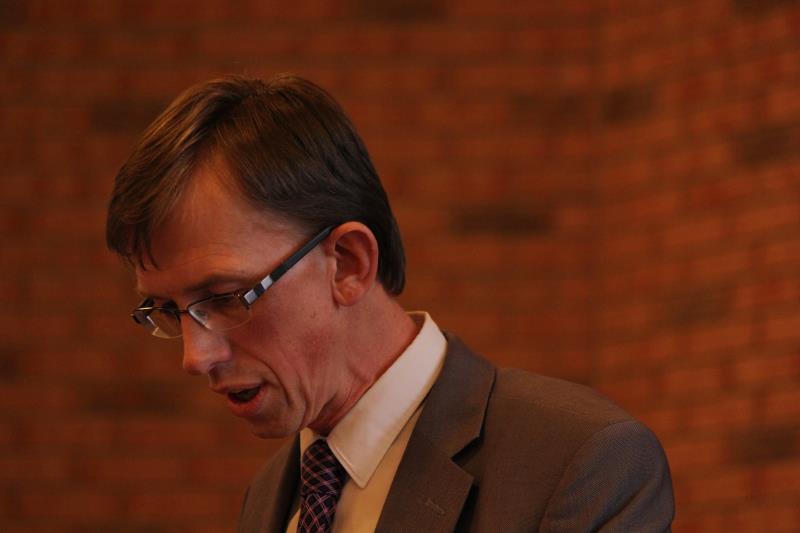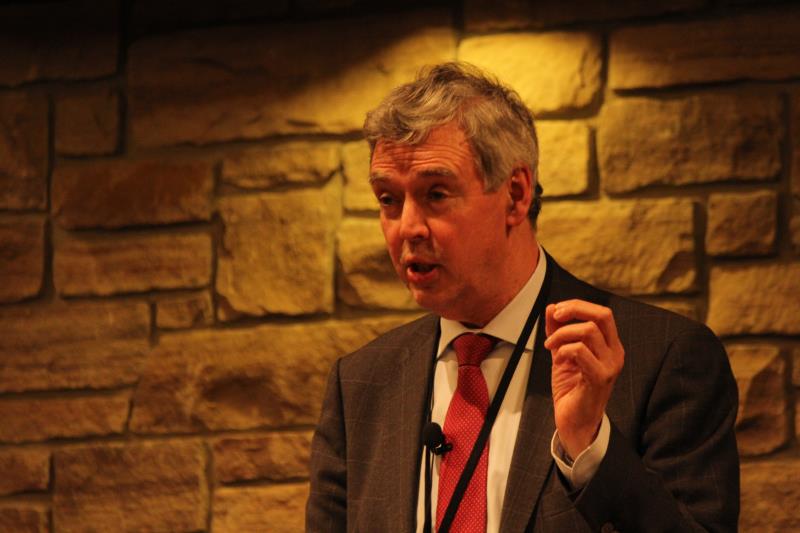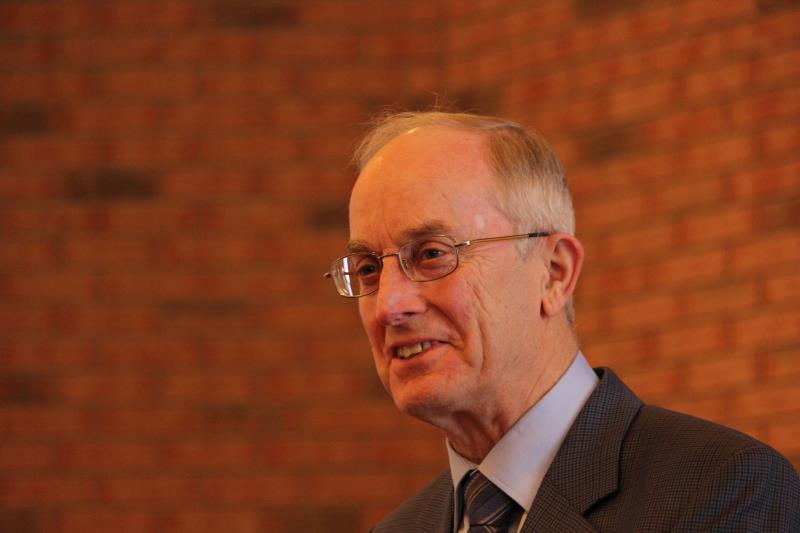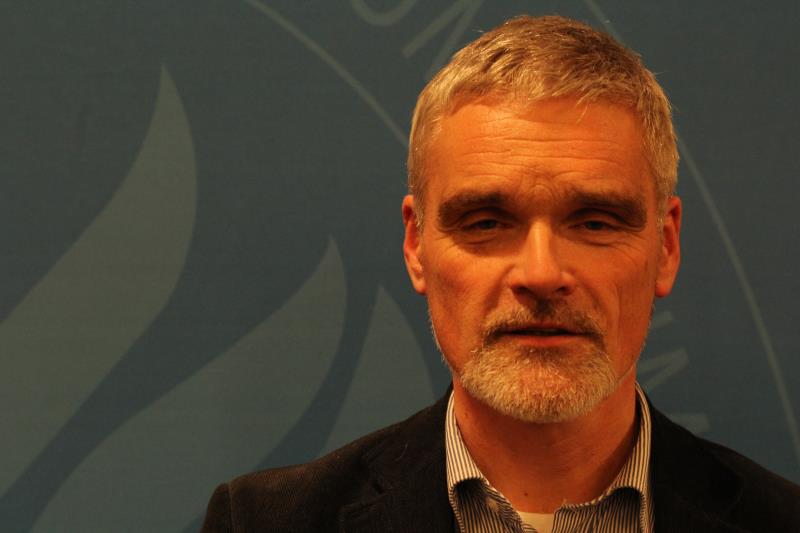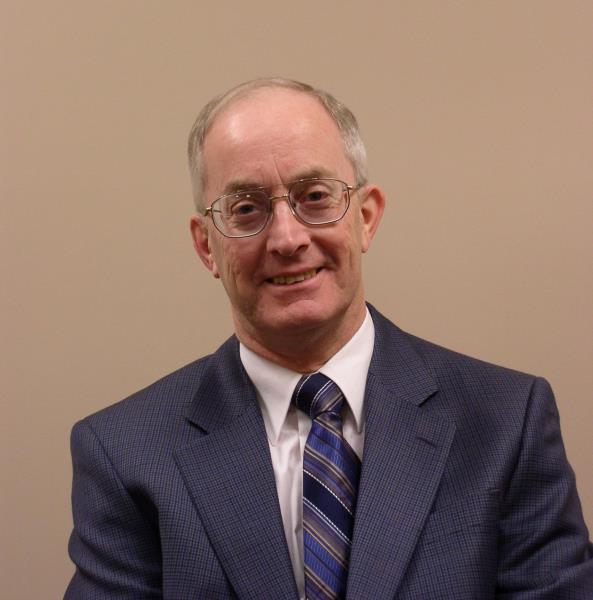Resource Finder
Displaying all results for resource type 'Videos'
112 Result(s)
Resources
Convocation 2024
The 2024 convocation evening celebrating God's faithfulness took place on Friday September 6, 2024, at 8pm in the auditorium of Redeemer University. Dr. Reuben Bredenhof gave his inaugural address entitled "The Preacher's Progress"and seven students received their MDiv degree.
Proclaiming the Doctrine of the God's Word: Using the Catechism Well in Worship
In Reformed churches catechism preaching, as it is often called, has been a staple in one of the weekly worship service for centuries. Long-standing practices, though, often need a fresh look. Why do we have this agreement in our church order? What questions have been raised about it, both in the past and the present? This speech explores the practice of preaching the doctrine of God's Word, using the time-honoured Heidelberg Catechism. It looks at the rationale underlying it and makes suggestions about how this kind of preaching can best serve God's people in our day and age.
Analogy or identification and the road to application
Application is the key for (reformed) preaching. But what can we say about responsible application? A case-study of four sermons about the same Biblical text gives us important insights. It’s all about analogy or identification between then and now.
Night Visions, Fasting, and Weary Shepherding: Reflections on Preparing and Preaching
Four horns, flying scrolls, a wicked witch: how does one preach on such night visions without getting night terrors or at least wondering along with the prophet himself “what are these, my lord” (Zech 1:9)? In this presentation, I will reflect on preparing and preaching from Zechariah without dreading it.
Personally speaking: The manner of addressing the congregation in preaching
What can the Book of Hebrews teach us about preaching? Hebrews is a sermon or exhortation which offers ministers wisdom for making well-timed and varied personal applications in preaching
The View from Above: Preaching from the Book of Revelation
Shortly before his retirement, Rev. Jan deGelder felt “confident” enough to start a series of sermons on the book of Revelation. As a kind of byproduct, this resulted in the publication of the book The View from Above: An Exposition of God’s Revelation to John (2020). In his presentation, Rev. deGelder will tell us how the sermon series came into being.
The Rise and Fall of Empires, and the progress of the Kingdom of Christ
The rise and fall of earthly empires stand in contrast to the inexorable progress of the Kingdom of Christ. This introduces us on the one hand to cyclical elements, and on the other hand to linear elements in our view on history. What are the implications of this for the witness of the church? How do we introduce the ‘rise and fall’ elements to unbelievers, and how do we show them their place in the progress of the Kingdom from its beginning until its consummation?
God's Battle Lines: The Antithesis in the Preaching of the Gospel
This presentation will address the following sorts of questions: What is the antithesis, and where does the idea of the antithesis come from? How can the theme of the antithesis be traced through the Bible, from the enmity between the seed of the woman and the seed of the serpent to the final victory of Christ over Satan? What place should the antithesis have in the preaching of the gospel? Can this theme be misused or overemphasized? How does the minister ensure that his sermons draw the battle lines correctly?
“Feed My Lambs”: Catechetical instruction within the unity of purpose of home, church, and school
Teaching and encouraging youth in the faith has been and continues to be an important part of the ministry of the Reformed Christian church. We will examine how catechetical instruction has a central role in reaching and teaching youth. By means of catechetical instruction, the youth of the church will increase in their knowledge of God and will be able to hone the skills needed to articulate their faith. We will also consider how catechetical instruction is an invaluable component in the threefold cord of home, church, and school. Bound together in unity, each strand has its distinct responsibility in helping youth “to be entirely committed to him whose mark and emblem we bear.” (BC Art.34)
Conference 2023 Closing Thoughts
Closing thoughts on the 2023 conference
Convocation 2023
The 54th Anniversary Meeting and the 49th Convocation held Friday September 8, 2023, at Redeemer University in Ancaster. Dr. Arjan deVisser, who is retiring as professor of Ministry and Mission, gave his address entitled “Enlarge the Place of Your Tent, do not hold back”: Reflections on the missional calling of the Canadian Reformed Church. During this evening Dr. Reuben Bredenhof was installed as the new professor of Ministry and Mission. Six students graduated with the Master of Divinity degree: Faustin Emadjeu, Caleb Kos, Timothy Slaa, Matthais Schat, Mark VanderLinde and Adam Werkman.
Convocation 2022
The 53rd anniversary meeting and 48th convocation of the Canadian Reformed Theological Seminary held on Friday September 9, 2022, at 8:00 pm., at Redeemer University in Ancaster. Featuring an address by Dr. Jason Van Vliet, professor of Dogmatics, who will be giving a speech entitled “Why Lord? When God’s Providence does not make sense”.
Convocation 2021
The 52nd anniversary meeting and 47th convocation of the Canadian Reformed Theological Seminary. Featuring the inaugural address "Christ (and) the True Temple" by Dr. W. denHollander.
Convocation 2020
The 51st anniversary meeting and 46th convocation of the Canadian Reformed Theological Seminary. Featuring the keynote address "Grace and Peace" by retiring faculty member, Dr. G. H. Visscher, and the installation of new faculty member, Dr. W. denHollander.
Between 9/11 and COVID -19
In this final chapel of Dr. Gerhard Visscher, he mentions to the CRTS community that he started teaching in that week when the twin towers of New York came crashing down. He ends using Zoom because of the threat of Covid-19. In these kind of times, we might wonder about the love and goodness of God. Where is He in all this? While not endorsing all that Miroslav Volf writes, he shows how the writings of this Yale professor are quite helpful for us. We wish Dr. Visscher and his wife Teny the Lord’s blessing as he retires after 19 years of teaching at CRTS and over 40 years of ministry. Have a listen if you like….
Ressources Chretiennes
Ressources chrétiennes is a website that makes Reformed resources available for the French speaking world. In this presentation Rev. Paulin Bédard explains the character and global reach of the website, as well as future projects that he is working on.
Mission Among Immigrant Communities in Canada
At a conference that focuses on world mission, we cannot ignore the fact that in many ways the world is coming to Canada. Each year more than 250,000 people from other countries receive permanent resident status in Canada. This has led to the establishment of many immigrant communities (and new mission fields!) in and around Canadian cities. Revs. Tony Zekveld and Matthew Vanluik have been involved in efforts to reach these “new Canadians” with the gospel, Rev. Zekveld by way of planting a South Asian congregation in Mississauga, Rev. VanLuik by way of integrating immigrants in an existing church in Brampton. In their presentations they reflect on their respective missionary methods.
Mission Among Immigrant Communities in Canada
At a conference that focuses on world mission, we cannot ignore the fact that in many ways the world is coming to Canada. Each year more than 250,000 people from other countries receive permanent resident status in Canada. This has led to the establishment of many immigrant communities (and new mission fields!) in and around Canadian cities. Revs. Tony Zekveld and Matthew Vanluik have been involved in efforts to reach these “new Canadians” with the gospel, Rev. Zekveld by way of planting a South Asian congregation in Mississauga, Rev. VanLuik by way of integrating immigrants in an existing church in Brampton. In their presentations they reflect on their respective missionary methods.
Work Undone and Fields Unwon: Why Global Missions Needs to be More of a Priority for All of Us
If you talk about the need global missions in Canada today, someone will inevitably share the popular perspective that significant investment of money and time into supporting foreign missionaries is no longer necessary because the nations are now on our doorstep and in our neighbourhoods. In this talk, I hope to expose the fallacy of this line of thinking, and demonstrate that global missions must in fact be more of a priority for us. To do this, I will survey the state of Christianity and missions around the world, share what other conservative, Reformed churches are doing to fulfil the Great Commission, and consider the state of "foreign mission mindedness" among our churches. Throughout, I will draw on my experiences as a pastor in Canada and as a missionary in Papua New Guinea.
"Preaching the Gospel in Lands Beyond You”: Paul’s Vision for World Mission
The apostle Paul worked tirelessly among the churches he had planted but he never lost his zeal to take the gospel to new areas where Christ had not been proclaimed (2 Cor. 10:16). At the beginning of a conference on world mission it will be good to reflect on Paul’s missionary approach. We will focus especially on the balance he maintained between planting churches in new areas and nurturing the churches he had already planted.
Mission Organization of the CanRC: Time to revamp the model?
When the Canadian Reformed Churches launched their first foreign mission projects in the late 1950s, they decided that the work of foreign mission should not be organized by a central mission board (appointed by general synod) but rather through the initiative of local churches. Ever since, CanRC foreign mission projects have been initiated and supervised by "sending churches" such as Toronto, Hamilton and Surrey. In this presentation we will raise the question whether the time has come to revamp the model and move to a more centralized approach. Advantages and pitfalls of both approaches will be discussed.
Louis Bourgeois or Luiz Gonzaga: Contextualizing Worship in Foreign Mission
Travel involves baggage. We take a lot of stuff with us when we go overseas, especially if we’re going for an extended period of time. The same is true for foreign mission, but the “baggage” that we bring is far less tangible and far more important. We bring ourselves, with our ethnic and social background, with our personal opinions and prejudices, shared experiences and expectations. So with these things in mind, I will be discussing Reformed worship and the “baggage” we bring with us, from my own Canadian-Brazilian perspective. Does our Reformed worship “work” in a foreign mission setting, or is Reformed worship too “euro-centric”? To what extent can or should it be contextualized?
A Lesson in Humility: The Challenge of Training Christ-Exulting Leaders in Foreign Mission
The great need for well-trained, Christ-exulting leaders in the global and local church cannot be overstated. Having witnessed the fallouts of poorly trained pastors, for example, lessons have been learned that are worth sharing. I will expose some of the inherent struggles in leadership training that we faced in Papua New Guinea - whether with pastors or lay-leaders -- and I will argue for an effective triad of learning between the local church, the local seminary, and post-seminary mentorship.
Exposing Worldviews: How the Challenges of Preaching in PNG are Surprisingly Relevant Everywhere
The process of leaving my ministry in my home culture and learning to minister and preach in another, very different one has been like learning how to crawl again. I have had to rethink the impact that culture, cultural assumptions, and worldview play in proclaiming the gospel of Christ, and I constantly experience how much these things matter. In this talk I want to share some of those experiences, and how the much neglected discipline of Elenctics, coined and promoted by the great Reformed missiologist, J.H. Bavinck, has been invaluably useful. But I think that a greater sensitivity to the impact of worldview and the use of Elenctics is not only valuable for foreign missions, it is valuable for all preaching everywhere.
Reformed Faith Confronting Witchcraft in Africa
Witchcraft beliefs and practices are still widespread in Africa and have a detrimental effect on the well-being of its people. It is a huge factor in hindering development and it has kept many in the bondage of Satan’s grip. The hope and freedom for Africa rests with the Reformed faith. How? Come and hear!
CRTS Convocation 2019
The 50th anniversary meeting and 45th convocation of the Canadian Reformed Theological Seminary.
Reading with Ancient Eyes: Children, Households, and Baptism in the First-Century
The New Testament recounts several occasions on which whole households were baptized (Acts 16:15, 30–34; 1 Cor. 1:16). Were children, and particularly infants, among those who received the sign and seal of the covenant? I plan to address this question from two angles. First of all (and briefly), I will demonstrate that the narratives themselves do not rule out the possibility. Secondly, I will present historical evidence for households in the Graeco-Roman world that suggests that the first readers of these narratives would have assumed the inclusion of children in these household baptisms. Consequently, I will argue that—if infant baptism were contrary to God’s design and desire—their exclusion would have needed to be explicitly marked. In this case, the silence speaks louder than words.
Pearls, Gifts and Beggars: Infant Baptism in the Early Church
In this talk, we will look at three early church fathers (Tertullian, Augustine, and Gregory of Nazianzus) when it comes to their views on infant baptism. Although they agreed that baptism is a precious gift, nevertheless, they disagreed about who should receive it. As we unpack the theological rationale of their respective views, we will also point out the weaknesses of those same views and consider some challenges they present for the Church today.
Those who belong to God have the Spirit of God: Children in the Reformation Documents
Credobaptists often argue that the Reformers uncritically took over infant baptism from the medieval church. The truth is actually that they continued it only on the basis of a fresh examination of Scripture. This examination led them to emphasize a newly-discovered biblical theme: God's covenant of grace with believers and their children. I will explain how Bullinger, Brès, and other reformers urged the churches to believe God when he said that the children belonged to him and that those who belong to him have the Holy Spirit.
Covenant and Christian Education
A good Christian school is a covenant school. A good Christian education is a covenant education. That is, it is one that is based upon the biblical teaching. And the heart of understanding Christian education is to be found in an understanding within your soul of the truth of God’s glorious covenant of grace with believers and their children.
Let the Children Receive the Sign of the Covenant
Should children be baptized and so receive the sign of God’s covenant? The Reformed say “yes”; Baptists say “no.” How can these two groups, who both love the Bible, come to such different conclusions? Much depends on answering two questions correctly. First, to what exactly is the sign pointing? Second, what is the character of the promise-conveying language that is sealed in the sacraments, including baptism? Giving due attention to the OT and NT, this speech will seek to provide relevant answers to these critical questions.
Growing Up into Christ: Renewing the Pathway to Maturity in the Church
How are Christian adolescents faring in the church today? What can the church do to build trust and demonstrate support? How can adolescents be shepherded along the pathway to maturity so as to equip them for a lifetime of fidelity.This speech will probe ways of categorizing adolescence in terms of psychological and faith development, unveil a biblical perspective on stages of spiritual growth, and offer recommendations for renewed pastoral practice today.
“Do not Hinder Them": Children in the Gospels
So what is the position of our Lord Jesus with respect to children? Is there any support in the gospels for the position that also today children are included in the new covenant? Can we learn anything here that helps us with questions about baptism and how we should view our children?
The Ups and Downs of Covenant Children in the Reformed Tradition
Dr. Rayburn will be speaking of the doctrine’s ups and downs in the Reformed tradition and of the response in Presbyterian and Reformed circles to his article, published in 1996, “The Presbyterian Doctrines of Covenant Children, Covenant Nurture, and Covenant Succession,” the first significant study of the theology of the covenant child in American Presbyterianism for upwards of 50 years.
Peter, Paul and the Promises of God to the Children of Believers
Are the rest of the New Testament books supportive of the belief that your kids are in the covenant? Texts like Acts 2:39, 1 Cor. 7:14, and Eph. 6:1-4 will be discussed and brought to bear on the larger discussion.
Mature in Christ: The Practice of Covenant Nurture in American Presbyterianism
Few things are dearer to the hearts of parents and pastors than our covenant children. We pray for them and instruct them with the goal “that we might present everyone mature in Christ” (Colossians 1:28). At the center of the church’s ministry is the preaching of the gospel, but our ministry to our covenant children also includes “warning and teaching everyone with all wisdom” (Colossians 1:28) in the context of covenant nurture. One of our greatest hopes and joys is to see them profess faith in Christ in the context of spiritual wisdom, maturity and servant-hood. The purpose of this essay will be to reflect on the way in which covenant kids are nurtured toward spiritual maturity in American Presbyterian Churches (OPC, PCA, etc.). Three particular questions will be addressed: 1. What is required of covenant children in order to make a profession of faith and begin partaking of the Lord’s Supper? 2. What sort of instruction is provided in order to equip covenant children for their profession of faith and servant-hood in the church? 3. What role do parents, pastors and youth ministries play in nurturing covenant children toward spiritual maturity? Empirical research will be presented that surveys the varying approaches taken within these churches, along with pertinent definitions and nuances. A summary and analysis will provide pastoral observations regarding the perceived strengths and weaknesses of the approaches described within these churches.
Cultural Factors in Missionary Work in the Big Smoke
God the Holy Spirit and the Real Gospel of Sovereign Grace for You
God not only ordains the ends, but also the means to accomplish his ends. In this talk I plan to look at matters like the rearing of covenant children in relation to God’s promises versus the commands he makes to parents and children to accomplish those promises. I plan to look at how, in the church, we deal with different types of conversions, as well as the reality that some of our children never undergo a conversion experience, but nevertheless are Spirit-led (Rom 8:14) Christians. The doctrine of grace, and what that means for how we live in the church, will also be discussed, especially as many Christians have to learn not only that they are saved by grace, but that others are as well and so we need patience, love, and gentleness as evidence of our own gracious attitude towards others who are not at the same place we are.
Freely-Chosen Faith? Real Gospel and Human Choice
Infants show from a very early age that they have their own will. How can we do justice to the whole of Scripture’s message when we describe the human will? Is it only bound to sin? Partly free? Like a robot that God controls? Objecting to Erasmus, Luther said the will was utterly bound to sin; Calvin said that there is no such thing as God “permitting” sin, for whatever he permits, he wills. Does this mean God has willed us to sin? Are we really responsible for sin? Today the discussion continues between those who describe the Reformed view as “compatibilism” and those who object that this philosophical category doesn’t fit what we confess in the Canons of Dort. I intend to present the options in a simple but clear manner, to help us preach and believe the whole doctrine of God with clarity and conviction.
To view the handout that goes with this video please see here.
God the Son and the Real Gospel of Sovereign Grace for You
Which news is better: that the battle has been won completely or that most of the fighting still has to be done? Did Jesus only make possible our salvation, or did he actually and fully complete it? In this presentation I hope to present the Son of God as all-glorious in his cross and resurrection, and help us preach the real good news that Jesus has fully redeemed, saved, reconciled, justified, and adopted those for whom he lovingly laid down his life.
To view the handout that goes with this video please see here.
The Heidelberg Catechism at the Synod of Dordt
Though the Synod of Dordt met primarily to address the Arminian controversy, the Heidelberg Catechism came up six times on the synod’s agenda. This presentation explores the six ways the synod dealt with the catechism: (1) The synod discussed ways to enhance regular catechism preaching in Sunday afternoon services. (2) It discussed ways to improve the manner of catechizing, for both youth and adults, in the home, school and church. (3) The Remonstrants (Arminians) presented their observations and suggestions for revision of the Heidelberg Catechism. (4) The Palatine delegation from Heidelberg gave its response to the Remonstrant observations. (5) The catechism was examined by the synod and approved by all delegations, both Dutch and foreign, as consistent with the Word of God. (6) The synod prepared forms of subscription, by which ministers, theologians, and teachers were required to affirm that the Catechism, along with the Belgic Confession and Canons of Dordt, fully agree with the Word of God.
To view the handout that goes with this video please see here.
What Is the Church Order of Dort and how Does It Maintain Real Gospel?
A church’s polity is important. This is where the rubber of faith and confession hit the road of life and practice. In churches with a Dutch Reformed background, the Synod of Dort is not only known for producing the Canons of Dort against Arminianism but also the Church Order of Dort against (Dutch) Erastianism. Dort polity is much appreciated by us Reformed folk as it brings to expression the real gospel of being united to Christ and his body, and being free in Christ and his body. My speech will begin by outlining the development of polity in The Netherlands from the 1560s to 1619. Next I intend to pay attention to some particulars: the role of the offices and congregation, confessional subscription, regulations regarding worship, and the relationship between local churches. This latter point will also be compared to the situation in other Reformed polities, and the presentation will close with a brief overview of the implementation of Dort polity in the centuries after the Synod of Dort.
To view the handout that goes with this video please see here.
What’s the Problem with Arminianism, and Who Are the Arminians Anyway?
I will give a brief history of the Remonstrants, but will focus in on a couple of key areas in their theology, such as their controversial doctrine of justification by faith. Most assume the Arminians were basically (in)famous for their free will doctrine, but I want to show how one error leads to several. That said, I will also discuss how Arminians are still Christians and how salvation is found by believing in Jesus Christ alone for salvation. I will also highlight the evolution of Arminianism over the centuries, what it can look like today, and the potential pastoral difficulties one has in dealing with modern-day Arminian thought.
A Virtual Tour of the Synod of Dordt
This presentation, with plenty of visuals, will put us on the ground in the old city of Dordrecht in 1618–1619, to depict the circumstances of the Synod of Dordt. We will explore the convening of the synod by the Dutch government, and the facility where the synod was held. The composition of the participants demonstrates that this was a national synod with an international character, with theologians from eight foreign territories. After examining the agenda and procedures of the synod, we will survey the course of the synod’s deliberations that lasted 6 ½ months. These fall into four phases: (1) Pro-Acta sessions, before the arrival of the Remonstrants (Arminians); (2) five weeks of procedural wrangling with the fifteen cited Remonstrants; (3) the synod’s response to the Remonstrant case by drafting and approving the Canons; and (4) the Post-Acta sessions dealing with various Dutch ecclesiastical matters. Finally, we will explore the meticulous process by which the Canons of Dordt were drafted, as the Synod’s response to the Remonstrant objections concerning predestination and related points.
To view the handout that goes with this video please see here.
God the Father and the Real Gospel of Sovereign Grace for You
Election. Limited Atonement. Perseverance of the saints. These can be difficult doctrines, both to understand and to apply. Questions multiply. Is it fair that God only chooses some and limits the atoning work of Christ to them? How can we confess perseverance when we know people—even those close to us—who once worshipped with us but have now turned away from the Lord? And here are some more, but slightly different, questions. What if election is viewed through the lens of adoption? What if the saints only persevere because God is a Father who will not give up on his very own children? In short, what happens when we remember that the real, sovereign grace of God is a thoroughly paternal mercy? May “God’s fatherly face” shine upon us as we explore this truth together (Canons of Dort, V:5).
NOTE: This speech was given at the CRTS Conference 2018 but recorded at a later date due to technical difficulties at the conference.
To view the handout that goes with this video please see here.
CRTS Convocation 2017
The 48th Anniversary and 43rd Convocation of the Canadian Reformed Theological Seminary. The keynote address "The Year of Jubilee" was given by Dr. J. Smith.
By Grace Alone: How and Why the Reformation Occurred (Audio Only)
It began five hundred years ago and it still matters—someone rediscovered grace. What was the Great Reformation? Why did this change happen? This opening presentation will define the event, lament the errors of the medieval church, rejoice in the scriptural incentive for reform, and review the many ways the Spirit used the reformers (preaching, prayer, publications, psalm singing, etc.). A dynamic and exciting picture will emerge to motivate us to keep spreading the gospel of grace today. Audio only.
Calvin on Sola Fide: Justified by an Assured Faith Alone? (Audio Only)
The Reformation made it abundantly clear that we are saved by faith, not by works. At the same time, “faith is the assurance of things hoped for” (Heb. 11:1). But what if I don’t always feel so assured in my faith? Must I be certain in my faith to be certain of my salvation? Following John Calvin as our theological guide, we will explore the challenging terrain of faith, assurance, and justification, with a special focus on comforting those who struggle “with various doubts of the flesh” (Canons of Dort, 5.11). Audio only.
Stealing God’s Glory: Farel, Calvin, and the Importance of a Scriptural Perspective
The overarching goal of early Reformed theology was the guarding of God's glory. Early French-language reformers like Guillaume Farel and John Calvin focused their critique upon all teachings and practices that—whether directly or indirectly—in their view detracted from God’s glory. Late medieval Christianity in particular had established practices that diverted recognition from God to the person. Farel and Calvin maintained that one must listen to God himself via Scripture in order to understand how God’s glory is robbed and how it ought to be acknowledged. Thus the conference will close with Soli Deo Gloria.
Zwingli on Sola Scriptura: The Clarity and Certainty of Scripture
Liberal views of the Bible see it as a book that is meant merely to inform rather than as the Spirit’s tool and power to transform. But when we lose confidence in the dynamic character of Scripture we would do well to listen to how the reformers grasped the living power of God’s Word. For reformer Ulrich Zwingli, the Bible was alive with soul-piercing, heart-discerning, life-giving potency. He believed that even the simplest person that approached God’s word with humble sincerity could come away with a rich knowledge of God, a deep inner delight in his grace, and a lively hope for the future.
Luther on Solo Christo: The Absolute Sufficiency of the Saviour for Sinners
Martin Luther was the most important theologian since Aquinas and the most original thinker since Augustine. His writings divided the western church, sparked revolts, and produced the greatest flurry of literature the world had ever seen. Perhaps no single person ever had more people trying to destroy his work and yet Luther was easily the most published man in the sixteenth century: what Luther wrote, Europe read. It is rare that we get to glimpse a giant, but in this lecture we’ll look at Luther for who he really was: a great man whose greatest accomplishment was to persuade a dying world that its only hope was a fresh understanding of the sufficiency of Christ’s person and work.
Developing a Multi-Year Program for Catechism Teaching: A Current Example
Rev. Peter Feenstra describes his approach to Catechism teaching and the multi-year curriculum which he has developed over the years. Recorded during the 2017 January Interim semester.
Developing Rubrics for Evaluation of Catechism Teaching: A Suggested Approach
Mr. Pieter Torenvliet (retired school principal, Abbotsford, BC) presents an evaluation form that could be used by elders who are called to visit and observe Catechism classes. Recorded during the 2017 January Interim semester.
To view the powerpoint presentation that goes with this video please see here.
To view the lesson plan on Lord's Day 8, please see here. and here. To view the student worksheet on Lord's Day 8, please see here.
Commitment and excitement about Catechism teaching: A review of ministers’ responses
Mr. Pieter Torenvliet presents the results of a survey he conducted among ministers in Canada and Australia, asking them about their approach to and experiences with Catechism teaching. Recorded during the 2017 January Interim semester.
The powerpoint presentation that goes with this video is available here.
Convocation 2016
The 47th Anniversary Meeting and 42nd Convocation of the Canadian Reformed Theological Seminary.
Christ’s Psalms, Our Psalms: Seeing the Saviour in the Psalms
Rev. Peter Holtvüwer describes the Psalms Project, a massive digital library of information and homiletical insights on the psalms, especially focussing on the lines that can be drawn to Christ. He uses Psalm 35 as an example. Recorded during the 2016 January Interim Semester.
Peacemaking in the Church: Unity in Decision-Making
Dr. Andrew H. Selle, Executive Director and counselor at Christian Counseling & Mediation, describes the factors that frequently lead to church conflict and the lays out some principles for peaceful decision-making and unity within the Christian church. Recorded during the 2016 January Interim Semester.
Notes or full manuscript?
Rev. Clarence Vandervelde, pastor of the Rehoboth Canadian Reformed Church in Burlington-Waterdown, explores the merits of preaching from notes instead of a full manuscript. Recorded during the 2016 January Interim Semester.
Peacemaking in the Church: Sowing for the New Creation
Dr. Andrew H. Selle, Executive Director and counselor at Christian Counseling & Mediation, lays the theological foundation for a culture of peacemaking in the Christian church and life. Recorded during the 2016 January Interim Semester.
Would Schilder Pass Classis?
At the 2016 CRTS Conference, Dr. Arjan de Visser describes the characteristics of the renowned preaching of the famous preacher and theologian Klaas Schilder—but considers whether some of those characteristics might have jeopardized his chances at passing a Canadian Reformed Classical Exam.
Preaching from Leviticus
At the 2016 CRTS Conference, Dr. James Visscher, Emeritus Pastor of the Canadian Reformed Church in Langley, B.C., explains the importance of preaching from Leviticus, and offers guidance and principles for doing this in relevant ways for our present day.
Imitating the Saints in Hebrews 11: Revisiting the Questions of Christocentricity and Application
Rev. Eric Watkins, pastor and church planter at the Orthodox Presbyterian Church in St. Augustine, FL, uses the model of Hebrews 11 to illustrate that the saints of the Old Testament played out the drama of redemption which would be fulfilled in Christ, and that the church of today is called to do the same.
Preaching from Song of Songs
Rev. Matthew VanLuik, minister of the Word at Grace Canadian Reformed Church in Brampton, ON, shares some insights and principles for preaching on the Song of Songs.
The Light of Life in the Shadow of Death: Gospel Ministry at Funerals
Rev. Bill deJong, pastor of Blessings Christian Church in Hamilton, ON, shares some insights and principles for leading funeral services and delivering Gospel-centered euologies.
Preaching the Whole Counsel of God
Dr. Lawrence W. Bilkes, Emeritus Pastor of the Free Reformed Church in Grand Rapids, MI, explains the importance of preaching the whole Gospel of God, and not merely those elements that are popular or pleasing to the culture of our present day.
Spiritual Guidance in Preaching
Dr. Lawrence W. Bilkes, Emeritus Pastor of the Free Reformed Church in Grand Rapids, MI, explains why true preaching presents the Gospel to the mind, the heart, the soul, and the conscience of the hearers.
The Relevance of Redemptive-Historical Preaching in a Postmodern Context: An Optimistic Proposal
Rev. Eric Watkins, pastor and church planter at the Orthodox Presbyterian Church in St. Augustine, FL, shows how the objectivity of redemptive-historical preaching and the metanarrative to which it points answers many of the questions that dominate our postmodern context.
How to do Sermon Evaluation at Consistory
Rev. Jack Moesker, Emeritus Pastor of the Canadian Reformed Church in Owen Sound, ON, offers guidance and principles for consistories to do effective sermon evaluations for the benefit of their pastor and congregation.
Evangelism and Planting Reformed Churches: Winning the Lost without Compromising the Faith
Rev. Eric Watkins, pastor and church planter at the Orthodox Presbyterian Church in St. Augustine, FL, shares his personal story and the lessons that he has learned about how to bring the gospel to the lost without compromising the faith.
CRTS Convocation 2015
The 46th Anniversary Meeting and 41st Convocation of the Canadian Reformed Theological Seminary.
CRTS Convocation 2014
45th Anniversary Meeting and 40th Convocation of the Canadian Reformed Theological Seminary. Dr. Van Raalte's keynote speech was "The Reason for Our Hope: Christ in our Apologetics." It begins at the 24 min 39 s mark in the video.
Will We Really Live on a New Earth?
Recorded during the 2015 CRTS Conference. Dr. Visscher examines some of the passages which deal with the doctrine of the new earth. Does the fire described by Peter in 2 Peter 3 eliminate the possibility of a new earth? Just how much can we expect of an eternal physical existence, according to Scripture? He also draws some conclusions regarding the question to what degree a new earth can be part of the believer’s hope and the church’s expectation.
Finding Eschatology in the Old Testament: The Psalms as Case in Point
Recorded during the 2015 CRTS Conference. Dr. Smith proposes a distinction between finding eschatology by way of explication (mining passages containing direct information about the end), by way of implication (exploring typological features, secondary fulfillments, etc.), and by way of application (pulling through eschatological lines; drawing out the significance of a passage for our future hope), illustrating the importance of such a distinction with samples from the book of Psalms. He concludes by asking in what sense an OT book can be called eschatological.
Love Never Ends
When Christians hear the word "love," they quickly think of 1 Corinthians 13, and rightly so. However, how can the Apostle Paul say that "love never ends," when in reality we see many different situations in which love is put under stress and, at times, even seems to come to an end. God's Word in 1 Corinthians 13:8 forms the basis for this speech by Dr. Van Vliet, given to a youth rally in Ontario in 2014.
Reformed Church Planting in the 21st Century
Talk delivered by Rev. Ross W. Graham at the 2nd annual CRTS Lecture Series - Rejoicing in Growth: Church Planting and Evangelism.
The Threefold Office of Christ and the Believer (Video)
A close look at Christ as our chief Prophet, only High Priest, and eternal King. Also, the implications of this for the lives of Christians is explored.
Eschatology: The Letter and the Spirit in 2 Cor. 3:6–18
Recorded during the 2015 CRTS Conference. Dr. Tipton argues that 2 Cor 3 does not draw the absolute contrast of letter and Spirit that some might discern. Rather, Paul speaks of what once gave life and righteousness (the letter) by comparing it to the super-abounding righteousness, life and glory of Christ, as well as the life-giving Spirit. The contrast is therefore a relative one that demonstrates how much richer God's people are after Pentecost, in some ways even richer than Adam and Eve in Paradise.
The Comforted I in the Catechism (Video)
The Heidelberg Catechism is known for its warm, personal tone. In this speech the author explores why this Catechism uses personal pronouns, such as I, me, and my when it does.
Catechism Preaching: Keeping it Fresh and Relevant
The Heidelberg Catechism, as a summary of God's Word, is used regularly in the afternoon worship service of many Reformed churches. How can the preacher keep his catechism sermons vibrant when he comes back to the same Lord's Days year after year?
"Until He Comes": Eschatological Aspects of Reformed Worship
Recorded during the 2015 CRTS Conference. Dr. de Visser begins by discussing Biblical foundations for the topic. Next he argues that faithful preaching should have a distinct eschatological quality. Then he examines what eschatological elements are found in the Reformed worship service, including psalms, hymns, and liturgical forms.
Preaching Through Revelation
Rev. G.Ph. Van Popta, pastor of Jubilee Canadian Reformed Church in Ottawa, ON, discusses his experiences of preaching through the book of Revelation, and the lessons he has learned. Recorded during the 2012 CRTS Interim Semester.
Motivating Reformed Churches to Multiply: The 2011 Metro Vancouver Church Planting Initiative
Dr. T.G. Van Raalte discusses the 2011 Metro Vancouver church planting initiative. Delivered at the second annual CRTS Conference in 2012. "Rejoicing in Growth: Church Planting & Evangelism"
From Catechumen to Communicant: Setting up a Curriculum for Catechetical Instruction
A speech presented at the CRTS January Interim 2013 dealing with how to arrange various levels of catechetical instructions from a pedagogical point of view. Mrs. Christine van Halen-Faber is the principal of the Covenant Canadian Reformed Teachers College.
Spreading the Seed of the Word: Reformed Foundations for Evangelism
Talk delivered by H. Drost, a Reformed church planter in Ukraine, at the second annual CRTS Conference, "Rejoicing in Growth: Church Planting and Evangelism."
Developing Missionary-Minded Congregations
Henk Drost, a Reformed church planter in the Ukraine, delivers a speech at the second annual CRTS Conference "Rejoicing in Growth: Church Planting & Evangelism."
Preaching With Illustrations: Is It Really Necessary?
Rev. T. Lodder, pastor of the Cloverdale Canadian Reformed Church, discusses the necessity of preaching with illustrations. Recorded during the 2012 CRTS Interim Semester.
Preaching Through the Gospels: Avoiding Pitfalls
Dr. G.H. Visscher, professor of New Testament at CRTS, discusses some of the pitfalls that are commonly encountered when preaching through the Gospels, and how to avoid them. Recorded during the 2012 CRTS Interim Semester.
Preaching the Gospel from the Law (Video)
Dr. Jannes Smith, professor of Old Testament at CRTS, explores how to preach the Gospel from the Old Testament Law. Recorded during the 2012 CRTS Interim Semester.
The Christian Funeral: A Witness to the Death and Resurrection of Jesus Christ (Video)
Mr. R. Ludwig, owner of Kitching, Steepe, and Ludwig Funeral Homes, discusses the Christian funeral as a witness to the death and resurrection of Jesus. He also deals with the topic of cremation. Recorded during the 2014 CRTS Interim Semester.
The Homosexual in the Church
Rev. J. deGelder, minister emeritus of the Flamborough Canadian Reformed Church, discusses the issue of members in the church with homosexual inclinations. Recorded during the 2014 CRTS Interim Semester.
A Biblical view of poverty
Recorded during the 2015 CRTS Interim Semester. Rick Postma, Director of Public Relations for Word & Deed, describes a Biblical view of poverty.
Mission work among the First Nations of Canada
Recorded during the 2015 CRTS Interim Semester. Rev. Jim Witteveen speaks of Mission work among the First Nations of Canada, and its potentials & pitfalls. Rev. Witteveen is a missionary of the Canadian Reformed Church in Smithers, serving in Prince George, B.C., Canada.
Developing a Plan for Congregational Outreach
Recorded during the 2015 CRTS Interim Semester. Rev. William Boekestein, minister at Covenant Reformed Church in Carbondale, Pennsylvania, speaks about developing a plan for congregational outreach.
The State of Confessional Presbyterianism and Where it Seems to be Heading
Recorded during the 2015 CRTS Interim Semester. Dr. Alan Strange, Professor of Church History at Mid-America Reformed Seminary, discusses the state of confessional presbyterianism and where it seems to be heading.
Planting a Reformed church in the “Northern Capital of BC"
Recorded during the 2015 CRTS Interim Semester. Rev. Jim Witteveen describes the task of planting a Reformed church in the “Northern Capital of British Columbia." Rev. Witteveen is a missionary of the Canadian Reformed Church in Smithers, serving in Prince George, B.C., Canada.
Mission work in Mexico
Recorded during the 2015 CRTS Interim Semester. Rev. Richard Bout, former missionary of the United Reformed Churches having served in Tepic, Mexico, speaks of mission work in Mexico.
Catechism Preaching
Dr. J. Visscher, associate pastor of the Langley Canadian Reformed Church, discusses how catechism preaching is different from preaching on a Scripture passage.
The Two Books Debate: What if Scripture and Science seem to say Different Things?
Recorded during Conference 2014: "Correctly Handling the Word of Truth: Reformed Hermeneutics Today." It is common to speak of the two books of God's revelation: the book of Scripture (special revelation) and the book of creation (general revelation). Support for this approach has been found in Article 2 of the Belgic Confession. However, should the book of creation, and scientific discoveries from it, impact how we interpret the book of Scripture? Or should it be the other way around? Dr. B. Kamphuis responds to this speech.
Interpreting the Bible in and with the Church: The Imperative for and Challenges of a Confessional Hermeneutic
Recorded during Conference 2014: "Correctly Handling the Word of Truth: Reformed Hermeneutics Today." This address revisits the issue of the authority and function of the church’s creeds and confessions in the interpretation of Scripture. After reviewing the decline of, and challenges to a confessional hermeneutic, in the centuries after the Enlightenment, the more recent emergence of the “theological interpretation” of Scripture is explored. This speech offers a defense of a confessional hermeneutic in the face of contemporary challenges. Dr. Dean Anderson responds to this speech.
1 Timothy 2:12-15: The Nature of Paul’s Injunction about Women
Recorded during Conference 2014: "Correctly Handling the Word of Truth: Reformed Hermeneutics Today." This speech begins by considering the role of women in the Greco-Roman world, discusses some aspects of Paul’s views in 1 Corinthians, and then explores to what degree his view was rooted in his convictions about the creation and fall of mankind.
The Reader as Focal Point of Biblical Exegesis
Recorded during Conference 2014: "Correctly Handling the Word of Truth: Reformed Hermeneutics Today." Many scholars have accepted the idea that biblical exegesis should focus on the text rather than on original author's intention. More recently, a third perspective has been added, which focuses on the reader of Scripture. In short, the reader (or: every reader) makes the (or: his/her own) meaning. This speech evaluates that approach.
A Soteriological Perspective on our Understanding
Recorded during Conference 2014: "Correctly Handling the Word of Truth: Reformed Hermeneutics Today." According to Paul in 1 Corinthians 2, it is the Holy Spirit who teaches us, and the mind of Christ that we receive. This indicates the importance of a soteriological perspective on how we interpret the Bible. Participation in Christ is a central motif in this address. Dr. Alan Strange responds to this speech.
The Structure of Jeremiah: Confessional Integrity and Quality Control
Recorded during Conference 2014: "Correctly Handling the Word of Truth: Reformed Hermeneutics Today." The first part of this speech will present a proposed structure for Jeremiah. A second part introduces and applies some critical methods to test the validity of the proposal. A third part assesses the profits and perils of the critical methods themselves and suggests what a Reformed Old Testament scholar can and cannot say. In this way the structure of the book of Jeremiah serves as a test case for the interplay of confessional integrity and quality control. A panel discussion follows this speech.
Accommodation: Another Wax Nose?
Recorded during Conference 2014: "Correctly Handling the Word of Truth: Reformed Hermeneutics Today." In Reformation times both sides were accusing the other of making Scripture a wax nose. Today one may well wonder whether the doctrinal construct of God’s “accommodation” in divine revelation has become a wax nose.
The Hermeneutics of Dogma
Recorded during Conference 2014: "Correctly Handling the Word of Truth: Reformed Hermeneutics Today." Not only the Biblical text, but also Christian doctrine requires interpretation. First, in discussion with Harnack’s thesis of the Hellenization of the gospel, this speech shows the importance of investigating this historical aspect of dogma. This also has consequences for the character of our commitment to the confession. Further, the catholicity of doctrine will be dealt with. Finally the metaphorical character of doctrine and its consequences will be discussed. Dr. A.J. de Visser responds to this speech.
Interpreting Historical Narrative: Questioning a Methodology
Recorded during Conference 2014: "Correctly Handling the Word of Truth: Reformed Hermeneutics Today." In discussions on understanding portions of Scripture that narrate historical events, the distinction is being made in conservative circles between Scripture’s truth claim and truth value. This speech asks whether such a distinction and method of determining truth and meaning in narrative passages is warranted and necessary as a model for biblical exegesis. Dr. van Bekkum responds to this speech.
Christian Ethics and God’s use of the Bible
Recorded during Conference 2014: "Correctly Handling the Word of Truth: Reformed Hermeneutics Today." Christian ethics is one area in which the modern and postmodern challenge is felt strongly. New questions arise about which the Bible does not seem to speak. Existing answers to old questions are attacked and give way to new proposals. How do Christians deal with this? Dr. T.G. Van Raalte responds to de Bruijne's speech.
Beginning Well in Ministry
The keynote address of Convocation 2013. What I wish I was told when entering the ministry.
Is Hell Obsolete? The Place of Eternal Punishment in Preaching Today
Recorded during the 2015 CRTS Conference. Some people believe that hell doesn’t exist, and that in the end, everyone will be saved. Other people believe that hell needs to be redefined. What exactly should we believe about hell? What does the Bible say about it? And doesn’t preaching about hell teach people to live in fear rather than faith? These questions, and more, are explored in this presentation.
Working Politically and Socially in Anticipation of Christ’s Coming
Recorded during the 2015 CRTS Conference. Dr. Van Dam begins by asking whether we have a political and social task. This question is answered in the affirmative based on the biblical evidence. How are we to realize this responsibility? Is the recent two-kingdom approach an option? Finally, what sort of expectations can we have as we go about exercising our Christian witness as anointed pilgrim servants of the King, Jesus Christ?
In Between and Intermediate: Living in Heaven's Glory
Recorded during the 2015 CRTS Conference. Dr. Van Raalte sets his talk within the framework that the New Creation is the thing we really are aiming for, whereas going to live with God in heaven is an intermediate step towards that goal. Within that framework, he argues against the view that persons are only physical and against the theory of soul sleep. Conversely, he supports the view that believers, in their souls, are immediately raptured into heaven's glory upon death and enjoy an ongoing existence there until Christ's return.



.jpg)

